|
The material on this website is intended for educational use only and may not be reproduced for commercial purposes without express permission from the appropriate copyright holder.
Le contenu de ce site Web est destiné à des fins pédagogiques seulement et ne peut être reproduit à des fins commerciales à moins d'en avoir obtenu la permission du titulaire du droit d'auteur approprié.
Note: click here for Residential Schools information.
"The indigenous peoples of Canada did not have written languages so they were not able to leave their own written records of early European intruders . . . Canadian archives, libraries, cathedrals, martyr's shrines, museums, forts and university hallways are all places that reflect Eurocentrism."
Emma La Rocque, 2010
"God blessed [male and female] and said to them: Be fruitful and increase in number; fill the earth and subdue it. Rule over the fish of the sea and the birds of the air and every living creature that moves on the ground."
The Bible Genesis 2, 28
"The language we speak [indigenous peoples] is an affront to the ears of the colonist in every way, because it is a language that challenges the fundamental tenant of Western thinking – that humans alone are possessed of rights and all the rest of the living world exists for human use."
Robin Wall Kimmerer
"This Doctrine of Discovery was linked to a second idea: the lands being claimed were terra nullius–no mans land–and therefore open to claim. . . the indigenous people simply occupied, rather than owned land. True ownership they claimed could come only with European –style agriculture."
Final Report of the Truth and Reconciliation Commission of Canada, Volume 1
"The records documenting Aboriginal/European relations from the 17th to the early 20th century were produced overwhelmingly to one side of this relationship alone – fur traders, explorers, missionaries, then government officials, the North-West Mounted Police Forces, and assorted immigrants. The vast majority of these predominately male observers present a distorted and narrow view of Aboriginal societies."
Sarah Carter, Aboriginal People and Colonizers of Western Canada to 1900
"The Doctrine of Discovery was issued by Pope Alexander VI in 1493. . . The Doctrine dictated that lands not occupied by Christians could be claimed in the name of the explorers. . . Indigenous people were consistently refereed to as 'savages' by all the European empires–an undeniably racist term coined by thieving minds to justify, in both religious and legal terms, the theft of Indian lands. . . The Doctrine upheld the notion that, because Indigenous people were non-Christians, they were inferior, uncivilized and not human–and therefore their land was empty or 'terra nullius."
Chief Clarence Louie, Rez Rules

Native battle with the Vikings, 1000 AD, John Henry Walker, McCord Museum, M930.50.2.11,1850-1885

Puck, New York, 7 December 1892
"Columbus did not discover a new world, he established contact between two worlds, both already old."
J. H. Perry
Doctrine of Discovery and Terra Nullius
https://www.ictinc.ca/blog/christopher-columbus-and-the-doctrine-of-discovery-5-things-to-know

Interpretation of 16th-century Inuk hunting from a kayak. De Martini Forbisseri Angli navigatione in regionae occidentis et septentionis: narratio historica, ex Gallico sermone; Dionyse Settle. [Noribergae N'urnberg, W. Germany] imprimebatur : in officina Catharinae Gerlachin, & Haredum Johanis Montani, LAC, anno 1580

The White Man Comes, The Canadian Courier, Toronto, G. A. Reid, artist, 23 March 1912
[Jacques Cartier's men] had a cross made thirty feet high, which was put in the presence of a number of the Indians on the point at the entrance to this harbour, under the cross-bar of which we fixed a shield with three fleurs-de-lys in relief, and above it a wooden board, engraved in large Gothic characters, where was written, LONG LIVE THE KING OF FRANCE. We erected this cross on the point in their presence and they watched it bring put together and set up. When we had returned to the ships, the chief. . . arrived in a canoe. And pointing to the cross he made us a long harangue, making the sign of the cross with two of his fingers; and then he pointed to the land all around about, as if he wished to say that all this region belonged to him, and that we ought not to have set up the cross without his permission."
Jacque Cartier, 24 July 1534
"The narrative in Canadian history textbooks is overwhelmingly one of progress – progress in taming the wilderness and the people who lived in it at the time of European arrival; plrogress in establishing orderly (European) systems of law and government, progress in building efficient systems of transportation, communication and trade… Indigenous people are outside the real action of textbooks because they are seen as outside the narrative of progress that is Canadian history. They were not part of the story of the taming of the wilderness, the settling of the land, the building of the cities, the story of production and commerce."
Penney Clark and Alan Sears

Native battle, John Henry Walker, McCord Museum, M930.50.2.16, 1858-1885

"Imagine that the whole of human settlement here in North America neatly fit into one year—we’ll use the most conservative estimation of 12 000 years of First Nations habitation: Columbus would arrive in the “New World” at noon December 25, at 10:30 p.m. on December 27 Samuel de Champlain would found Quebec, and the Dominion of Canada would be founded at 2:00 a.m. on December 30 (The idea of putting the whole human history of North American into the chronology of one year belongs to scholar Sarah Carter)."
Jesse Adrian Thistle

Les vertus de l'annedda (Indiens donnant à Jacques Cartier le remède au scorbut, 1534). The Virtue of the Tree Annedda (Indians showing Jacques Cartier the Cure for Scurvy, 1534). LAC Acc. No. 1990-324-5, Hal Ross Perrigard, 1928
[The world ignored this discovery of the cure for scurvy until a Scottish naval officer read about the incident with Cartier. In 1795 he recommended that all naval ships be supplied with lime juice (another source of vitamin C). Indian discoveries of thousands of drugs made possible modern medicine and pharmacology.]

John Guy’s Colonists Greeting the Beothuk in Newfoundland, Copper Engraving, Theodore de Bry, Americae Pars Decima, 1619

Anishnawabe Scout,. Hamilton MacCarthy 1918

[More than 50% of our farm products consists of plants used by the Indigenous peoples. They include tomatoes, pumpkins, potatoes, corn, beans, peanuts, beans and chocolat. They also provided us with many medicines.]

Judge's Library, New York, November 1910
"The Indians (north and south) gave the world three fifths of the crops now under cultivation."
Jack Weatherford, Indian Givers
{potatoes, cotton (long strand), rubber, tobacco, corn, beans, squashes, peanuts, sunflowers, Sweet potatoe, cacao, amarunth, peppers, tomatoes, cranberries, chili, tapioca, pecans, papaya, cashews, blueberries, avacado, etc.]
"Hospitals for the poor would be useless among them because there are no beggars. Those who have are so liberal to those who are in want, that everything is enjoyed in common. The whole village must be in distress before any individual is left in necessity."
Jesuits describing the Iroquois
"The canoe . . . was to be used as our principal means of transportation – personal, governmental, military and commercial – for several centuries. Why? Because the First Nations had developed the appropriate means of transport for our road system, that is, our rivers and lakes."
John Ralson Saul, A Fair Country
"Every inch of penetration westwards by first the francophone and then the anglophones was dependent on Native support for guidance, food, tactics and negotiations."
John Ralston Saul, Reflections of a Siamese Twin
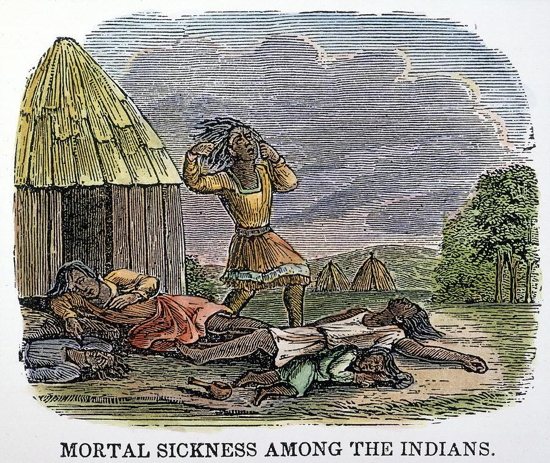
Colonists introduced European diseases such as smallpox, chicken pox, measles, whooping cough, cholera, scarlet fever, mumps, tuberculosis, influenza and typhus, among First Nations. Lacking immunity to such diseases wave after wave of epidemics drastically reduced the number of First Nations people living in North America.
[It is estimated that between 75 and 95 percent of the Aboriginal people were killed by diseases brought over by the newcomers (67.5 to 106.4 million Aboriginals.]
Bev Sellars, Price Paid The Fight for First Nations Survival
[The Royal Proclamation of 1763 stated that Aboriginal title existed and that all land would be considered Aboriginal until ceded by treaty.]
"The most consistent theme in the descriptions penned about the New World was amazement of the Indians personal liberty, in particular their freedom from rulers and from social classes based on ownership of property. . . Modern democracy as we know it today was as much the legacy of the American Indians, particularly the Iroquois and Algonquins, as it is of the British settlers, or French political theory, or of all the failed efforts of the Greeks and Romans."
Jack Weatherford, Indian Givers
"Savages we call them, because their manners differ from ours, which we think the perfection of civility; they think the same of theirs."
Benjamin Franklin, 1784

Iroquois on warpath, Jacques Grasset de Saint-Sauver, 1795-1796 LAC Acc. No. R13133-175
"When all the men are heavy laden, they can neither hunt nor travel to any considerable distance . . . Women, added he [Matonabbee, Hearne's Chipewyun guide], were made for labour; one of them can carry, or haul, as much as two men can do. They also pitch our tents, make and mend our clothing, keep us warm at night; and, in fact, there is no such thing as travelling any considerable distance, or for any length of time, in this country, without their assistance. Women, said he again, though they do every thing, are maintained at trifling expense; for as they always stand cook, the very licking of their fingers in scarce times, is sufficient for their subsistence. . . In a country like this. . . a partner in excessive hard labour is the chief motive for the union. . . when the men kill any large beast, the women are always sent to bring it to the tent: when it is brought there, every operation it undergoes, such as splitting, drying, pounding, etc. is performed by the women. When any thing is to be prepared for eating, it is the women who cook it."
Samuel Hearne, Oct. 1770
[There was significant pre-contact trade in slaves (in BC). . . There was also some direct European participation in the slave trade. . . Slave killings continued in some communities until about 1870 (associated with the potlatch). . . European power to interfere in the events within a native community was quite limited until well into the historic period. . . Although slavery became illegal in British territory in 1834 and in all American territory in 1865, there is little evident that either the British or the American authorities took strong steps to end aboriginal slavery on the Northwest coast either before or after these dates.]
Leland Donald, Aboriginal Slavery on the Northwest Coast of North America
Google: First Nations & Their Slaves - The Dorchester Review
"A dreadful skin disease, loathsome to look upon, broke out upon all alike. None were spared. Men, women and children sickened, took the disease and died in agony by hundreds, so that when the spring arrived three was scarcely a person left of all their numbers to get it. Camp after camp, village after village, was left desolute."
Mulks, a 100 year old Squamish chief testimony about an epidemic that hit the coast of BC in 1782

'THE TORONTO PURCHASE', 1788. The final treaty between the Crown and the Indian Chiefs for the purchase of lands whereon the city of Toronto was eventually built. John David Kelly, Copyright: Confederation Toronto, 1939

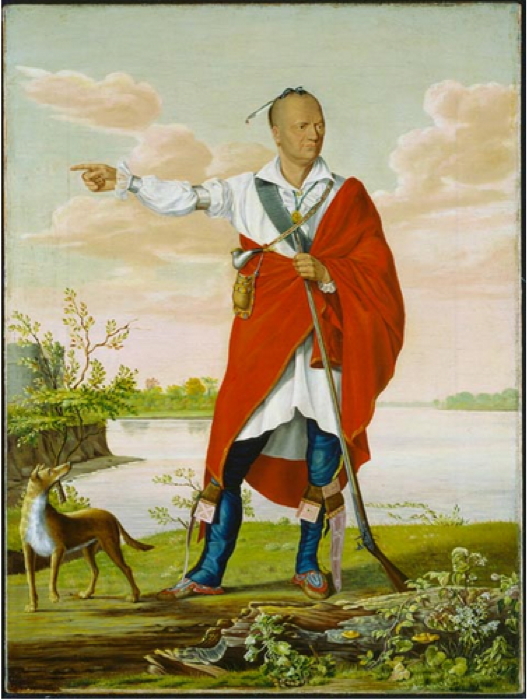
Thayendanegea (Joseph Brant), National Gallery of Canada 5777, William Berczy,c. 1807
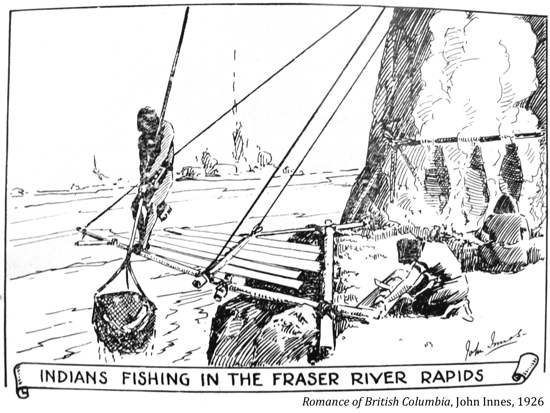

A Moravian Missiolnary conversing with the Eskimo at Nain, Labrardor. Missionnaire moravien conversait avec en inuit à Nain, Labrador. C-124432, 1819
"Rather than sending soldiers and guns to control the owners of the land the government had the missionaries who influenced the Native people to limit their movements, take up an agricultural lifestyle, and abandon their culture."
Celia Haig-Brown

Indian Hunters Pursuing the Buffalo in the Early Spring. Chasseurs indiens poursuivant le bison, tôt au printemps. LAC, Acc. No. 1981-55-68 Bushnell Collection, Peter Rindischbacher, ca. 1822.
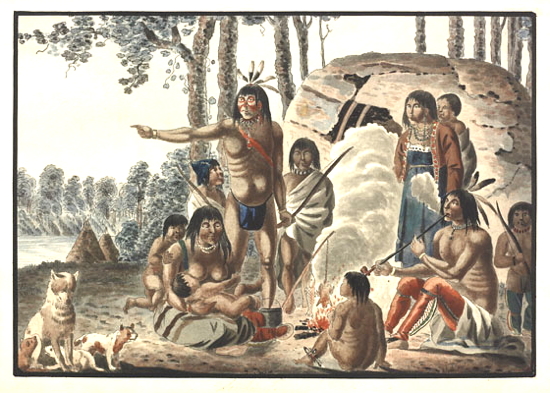
A family from the tribe of the wild Sautaux Indians on the Red River. Une famille appartenant à la tribu des Indiens Saulteux qui vivent en liberté dans la région de la rivière Rouge. Peter Rindisbacher, Acc. No 1988-250-28, 1821

Hunting the Buffalo. LAC Acc. No. R9266-1049 Peter Winkworth Collection of Canadiana, Peter Rindischbacher, 1836.
"Not since the spread of corn had the West seen such a powerful force of change
. . . horses changed how many people lived their lives, saw their world, and organized their lives."
Great Plains after 1700

Two views of Wi-jun-jon, first, on his way to Washington, then, on his return to his village. Currier & Ives, New York, 1837, LC9850792


A Missionary Descending the Rapids in a Canoe with Indians. LAC Acc. No. R9266-3442 Peter Winkworth Collection of Canadiana [Bishop Mountain's travels to the North-west mission in Manitoba] 1845

MiKmaq women selling baskets 1845 LAC Acc. No. R9266-319

Trapper's Bride, Alfred Jacob Miller
"By marrying into the indigenous world, most of the newcomers were marrying up. They were improving their situations, politically and economically. . . The HBC built its networks – for more than 200 years one of the world's largest commercial and political structures – in good part through interracial marriages."
John Ralston Saul, A Fair Country

"Tensions boiled over in August 1858 when a miner raped a Nlaka'pamux woman. In response, the community killed him and dumped his body into the Fraser River. Miners organized volunteer militias to mount a show of force."
Keith Thor Carlson, The Power of Place

Indian artifacts, John Henry Walker, McCord Museum, M930,50.5.299, 1850-1885
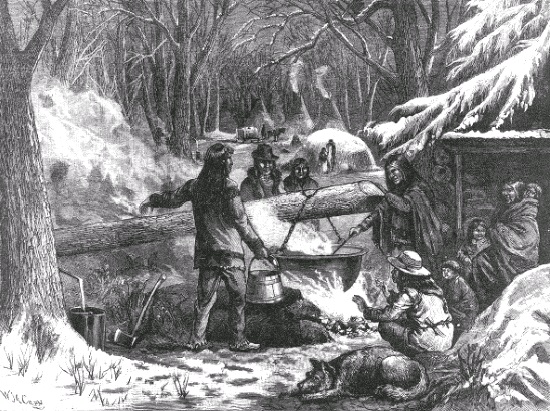
Sugar-Making Among the Indians in the North, Canadian Illustrated News, Montreal, 12 May 1883

Potlatch Fort Hope, 1859

On Kaministiqwia River. Camp sur la rivière Kaministikwia. William Armstrong, LAC No. 1970-188-1951, ca. 1860
"Indian trails throughout North America invariably follow the best line of travel through a wild country."
Henry Spencer Palmer, Royal Engineer Report on the Harrison-Lillooet Trail, 1859
"If one understands the native religion of my people, it is not difficult to understand why so many of us embraced the gospel of Christianity. There was simply not that much difference between what we already believed and what the missionaries preached to us. . . The Christian concept of sharing was nothing new to us."
Chief John Snow, These Mountains Are Our Sacred Places
"We found almost everywhere Indians willing to labour hard for wages, and bargaining acutely for [them]; and perfectly acquainted with gold-dust, and the minute weights for measuring one and two dollars worth . . . It was the uniform practice of storekeepers to entrust these Indians with their goods, generally 100 lbs. of flour, beans, or pork, and provisions for their burdens . . . My impression of the Indian population is, that they have far more natural intelligence, honesty, and good manners, than the lowest class – say the agricultural and mining population – of any European country I ever visited, England included."
Mathew Baillie Begbie,1861

Execution of the Thirty-Eight Sioux Indians, Mankato, Minnesota, 26 Dec. 1862. Fighting began when four hungry Sioux stole some eggs from a homestead. Hundreds of settlers were killed and 1700 Sioux were imprisoned and many Sioux condemned to death. Published in Buffalo, 1883, LC2004667224

New York Historical Society
[The Gradual Civilization Act in 1857 meant that] Indians were now to be confined to reserves until sufficiently civilized to be "emancipated from their Indian status and assimilated into mainstream society."
Peter H. Russell, Canada's Odyssey
"The intent of the 1857 act and subsequent acts was that Indians would disappear as a distinct cultural group . . . Indians would not however, participate in a system that promoted assimilation."
Sara Carter, Lost Harvests

John Ross Brown, "Protecting the Settlers", The Indians of California, 1864
[The handiwork of these well armed death squads combined with the widespread and random killing of Indians by miners resulted in the death of thousands of Indians in the first year of the California gold rush. - California Indian History, State of California.]

Interior of a Salish Longhouse. LAC Acc. No. R9266-343 Peter Winkworth Collection of Canadiana, Edward M. Richardson, 1864

Attack on village in Clayoquot Sound by boats of HMS Sutlej and HMS Devastation, BC Archives, J. R. Mackey PDP00084¬_141, 1864
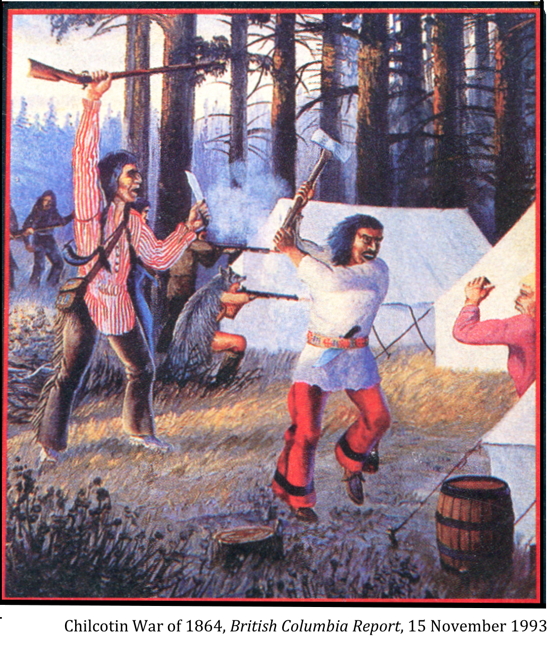

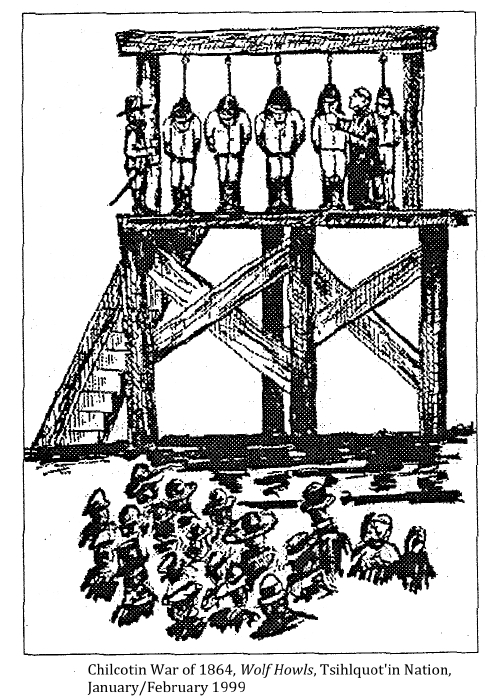
"In the summer and fall of 1862 the Tsilhqot'in people died by the thousands. At least 70 percent of the whole population perished from one cause alone [smallpox]. . . This was a truly great calamity. . . Native people universally believed settlers had imported and spread smallpox among them for their land. . . The British Crown hung five Tsilhqot'in officials. This was one of the most dramatic moments in all Canadian history. BC Colonial officials had chosen to pretend these Tsilhqot'in were common criminals. Murderers. The Tsilhqot'in people knew them instead as martyrs. True noble men who died serving their people by faithfully following the established law and by honorably defending the people in a just war against a proven aggressor."
Tom Swanky, The True Story of Canada's "War" of Extermination On the Pacific plus The Tsilhqot'in and other First Nations Resistance
"We meant war not murder."
War leader defence
"The Tsilhqot'in were induced by a false promise [a peace conference with the Governor]."
Matthew Baillie Begbie
"Madame Speaker, I stand here today in this Legislature, 150 years later, to say that the province of British Columbia is profoundly sorry for the wrongful arrest, trial and hanging of the six chiefs and for the many wrongs inflicted by past governments. . . Smallpox, which by some reliable historical accounts there is indication was spread intentionally. . . To the extent that it falls within the power of the province of British Columbia, we confirm without reservation that these six Tsilhqot’in chiefs are fully exonerated of any crime or wrongdoing."
Premier Christy Clark, 2014


Aboriginal women mending a canoe LAC PA 074670
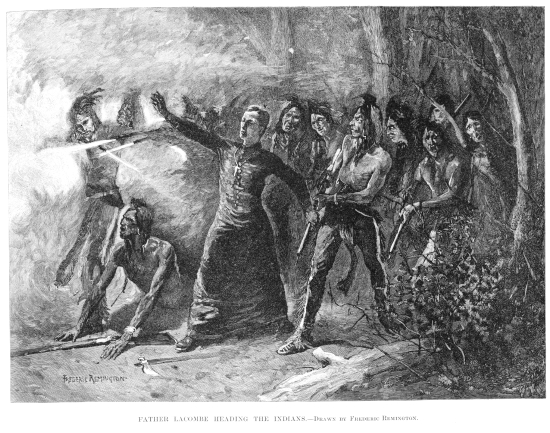
Father Lacombe, missionary of the Oblates, was grazed by a bullet while trying to establish a cease-fire between the Blackfoot and Cree, Battle River, 1865, Frederick Remington, Harper's Weekly, 18 October 1890, LC96510490

Shoshonie Woman: Throwing the Lasso. LAC Acc. No. 1946-113-1 Gift of Mrs. J.B. Jardine, Alfred Jacob Miller, 1867
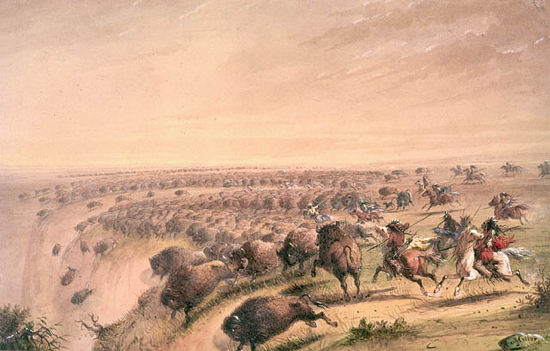
A Buffalo Rift. Ravin de bisons. Alfred Jacob Miller, LAC Acc. No. 1946-110-1, 1867

Pawnee Indians Watching the Caravan. Indiens de la tribu des Pawnees épiant la caravane. Alfred Jacob Miller, LAC Acc. No. 1946-138-1 Gift of Mrs. J.B. Jardine, Oklahoma, 1867
"We never sold these lands [Indigenous land] to you [Hudson's Bay Company] and yet you sell these lands to the Strangers [Canadians] for much money . . . How is it that you want to sell what is not yours."
Mahkesis, 1868
"Confederation . . . represented a deliberate attempt to remove Indigenous peoples from western lands and impose a new order based on agriculture and rooted in Anglo-Canadian civilization."
Bill Waiser
"[When Canada negotiated with the Hudson's Bay Company directorship in London to acquire Rupert's Land] no representative from Rupert's Land, including Indian and Metis peoples were invited to participate, let alone even consulted."
Bill Waiser

Diogenes, Montreal, 24 September 1869

Diogenes, Montreal, 8 October 1869

Potlatch at the Songhees village, Victoria, LAC C-24286, Frederick Dally, ca. 1870

Civilization and Barbarism, Winnipeg, Manitoba, William G. R. Hind arttist, ca. 1870, , Metropolitan Toronto Public Library JRR 2294 Fra
"Aboriginal peoples . . . are still being hounded and haunted by White North America's image machine, which has persistently portrayed them in extremes as either the grotesque ignoble or noble savage. . . The Civ/Sav doctrine (Civilization/Savage) permeates Canadian culture and is obviously very powerful . . . it dichotomizes Native-White relations in terms of civilization inevitably winning over savagery. . . Aboriginal Nations fighting to save their persons, communities, cultures, and lands was propagandized as simple irrational violence of bloodthirsty savages."
Emma LaRocque, When the Other is Me Native Resistance Discourse 1850-1990
[The term 'Civilization' or 'Progress' was used to justify the conquest and dispossession of peoples native to their lands. The Civ/Sav doctrine permeates Canadian culture.]

AMERICAN PROGRESS, John Gast, c. 1872, Library of Congress

Harper's Weekly, New York, 8 October 1870
"About five o'clock the next morning, I got up to see about my horses . . . I could see buffalo all over. There were thousands and thousands of them . . . All around us, as far as we could see, the plains were black with buffalo. The prairie seemed to be moving . . .
There was one thing that I did not like about that hunt. I saw hundred of buffalo, during that week, slaughtered for their hides. The whole carcass was left to rot on the plains. . . There were many bands of hunters on the plains beside ours. In all my years of buffalo hunting, I never destroyed buffalo for their pelts alone. I always took the whole carcass . . . My wife had once said that since we were going to make a living hunting buffalo, she did not want me to kill more than we could dry and pack . . .
The Yankees shot more buffalo for their hides than all the Indians and half-breed hunters put together. The Indian knew better. They did not want to see the buffalo gone forever. Parties of Yankees used to come up to the North-West to shoot for sport. They would sit on hill and shoot. Once Buffalo Bill came on a shooting trip, and shot five hundred buffalo—just for fun."
Norbert Welsh, as told to Mary Weekes, The Last Buffalo Hunter, New York, 1939, pp.82-85
"With emigrants of all Nations flowing into the country [the prairies] we are in constant danger of an Indian war . . . This may be prevented only by an early organization of a mounted police."
Sir John A. Macdonald, 1871
"We heard our lands were sold and we did not like it, we don't want to sell our land; it is our property, and no one has a right to sell them. [But we need] cattle, tools, agricultural implements, and assistance in everything when we come to settle – our country is no longer able to support us."
Sweet Grass, 1871
"[Indians could not] stop the power of the white man from spreading over the land like the grasshoppers that cloud the sky and then fall to consume every blade of grass and every leaf on the trees in their path."
Cree leader
"Every buffalo dead is an Indian gone."
U.S. Army colonel

The Manitoba Indian Treaty - Indian Chief Harranguing at the Stone Fort. LAC Acc. No. R9266-3764c: Peter Winkworth, Canadian Illustrated News, Sept. 9, 1871, [On August 3, 1871, Treaty No. 1 was signed between the federal government and seven chiefs of the Ojibway (Saulteaux) and Swampy Cree First Nations at Lower Fort Garry.]
"What I trust and hope we will do is not for to-day and tomorrow only; what I will promise , and what I believe and hope you will take, it to last as long as the sun shines and yonder river flows."
Treaty Commissioner Alexander Morris
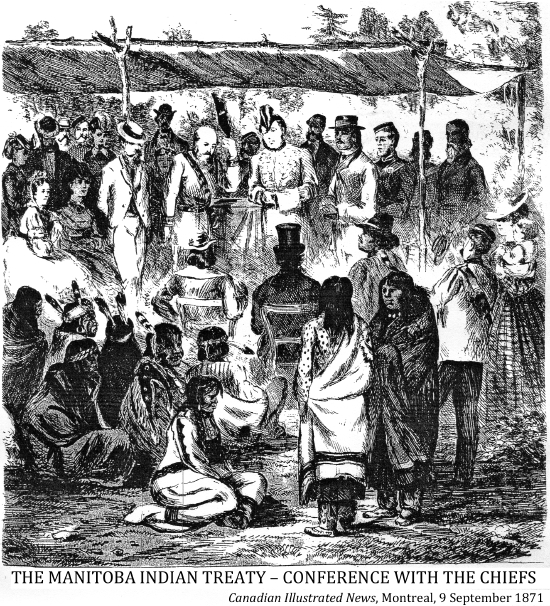
"THE MANITOBA INDIAN TREATY
The making of a treaty with the Indians of Manitoba marks an era in the history of the settlement of that Province. But for the peaceful arrangement of the Indian claims the progress of settlement might have been interrupted by such scenes between the Indians and the Whites as have disgraced the Western States of the American Republic, and Canada would have forfeited the good name it had previously acquired for dealing fairly, and even generously, with the Red Man. . . It effectively puts an end to all danger of trouble with the Indians."
Canadian Illustrated News, 9 September 1871
"The creation of Canada . . . was above all an act of imperialism. A nation-state annexed land inhabited by many other nations and then made them second-class citizens."
Will Ferguson, Why I Hate Canadians

Treaty medallion, LAC 70758, 1873-1899

Treaty medallion, LAC 70758, 1873-1899
Treaties from 1760 - 1923: Two sides to the story
http://www.cbc.ca/news/canada/treaties-from-1760-1923-two-sides-to-the-story-1.1081839
"The truth of the matter is that Indigenous Peoples did not for a minute believe they were giving away their rights to use the land and its resources in return for tiny reserves and what would become broken promises. The spirit of the treaties is that they were peace and friendship treaties. Indigenous Peoples were agreeing to share the land with settlers, not to disinherit themselves."
Michelle Good, Truth Telling

Harper's Weekly, New York, 10 May 1873
"The Canadian federation was formed at the high tide of European imperialism, when white people. . . believed fervently in their racial superiority and . . . the 'obligation to rule subordinate, inferior, less –advanced peoples.'"
Peter H. Russell, Canada's Odyssey, p.150
"The Indians believed that no one owned the land. The whites were bound by their view of the world as something to be owned and conquered."
Robert Fulford, Saturday Night, July 1985
"Our hearts have been wounded by the arbitrary way the Government of B.C. has dealt with us in allocating and dividing our reserves . . . For many years we have been complaining of the land left to us being too small . . . We have felt like men trampled on, and are commencing to believe that the aim of the white men is to exterminate us as soon as they can, although we have always been quiet, obedient, kind and friendly to the Whites."
Petition to Ottawa, 1874
"Disposession and displacement were everywhere, and so was Native protest in the form of letters, petitions and editorials."
Emma La Rocque
"The purpose of making treaties was not to establish a continuing relationship of mutual help and the sharing of the country, but to pave the way for British settlers by isolating groups of Indians on tiny reserves, denying them the possibility of carrying on their traditional economy or the opportunity to participate in the new economy on the off-reserve lands they were considered to have "surrendered."
Peter H. Russell, Canada's Odyssey
"In Canada, relocations were employed ostensibly to further the official goals – protection, civilization and assimilation – of Canadian native policy."
Thomas King, The Inconvenient Indian
"Progress – railways, the telegraph, mechanized farming, immigrants from Ontario and later Europe, and an organized government, police and legal system – was inevitable, and neither the Métis nor the Indians could continue to live in their traditional ways."
Richard Gwyn, Nation Maker Sir John A. Macdonald
"These [treaties] were permanent nation-to-nation agreements with obligations on both sides. To this the governmental negotiators committed the Crown legally, ethically and morally. And over the last four decades that reality has led the Supreme Court to rule repeatedly in favour of the Aboriginal position and against that of Ottawa, the provinces and the private sector. Anyone sworn in as a Canadian citizen today or tomorrow inherits the full benefits and the full responsibilities – the obligations – of those treaties."
John Ralston Saul, The Comeback
"We all know that the treaties involved a massive loss of land for First Nations. What most of us pretend we don't know is that this remarkable generosity was tied to permanent obligations taken on by colonial officials, then by the Government of Canada; that is, by the Crown, that is, by you and me. So we got the use of the land – and therefore the possibility of creating Canada – in return for a relationship in which we have permanent obligations. We have kept the land. We have repeatedly used ruses to get more of the land. And we have not fulfilled our side of the agreement."
John Ralston Saul, The Comeback

Hunting buffalo during the North West Mounted Police long march of 1874, Canadian Illustrated News
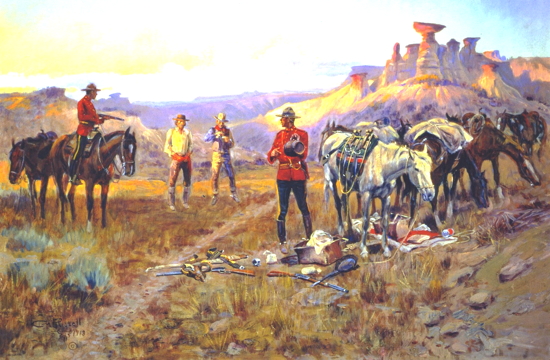
Whiskey smugglers caught with the goods, Charles M. Russell, 1913
"What I offer you is to be while the water flows and the sun rises."
Alexander Morris, 1 October 1873
"There are only two things I want from Indians–the first is peace–second is their land."
President George Washington
"Just suppose that all supplies were cut off from Montreal: all factories closed because there was nothing to manufacture; the markets forsaken because there was nothing to sell; in addition to this neither building material or fuel to be attained; how sad would be the condition of the tens of thousands of your great city! Now, the situation of these prairie tribes is exactly analogous to this state. For ages they have lived upon the buffalo; with its pelt they make their wigwams; wrapped in the robe of the buffalo they feared not the cold; from the flesh of this wild ox they made their pemmican and dried meat; while they possessed the sinews they needed no stronger thread; from its ribs they manufactured sleighs . . . The manure of the buffalo is all the fuel they had – in a word they were totally dependent on the buffalo."
George McDougall, 1875
"I speak directly to Poundmaker and The Badger and those others who object to signing this treaty. Have you anything better to offer our people? I ask, again, can you suggest anything that will bring these back for tomorrow and an the tomorrows that face our people?
I for one think that the Great White Queen Mother has offered us a way of life when the buffalo are no more. Gone they will be before many snows have come to cover our heads or graves if such should be."
Chief Mistawasis, 1876
"It is vital that people understand how the utter failure and betrayal of the treaties – nation-to-nation agreements First Nations signed with the British Crown – worked in conjunction with a paternalistic piece of legislation called the Indian Act to isolate Indigenous people on remote reservations and to keep them subservient to Ottawa for more than one hundred years. . . It was through the Indian Act that the Canadian government formed policy surrounding residential schools, placed bans on religious ceremonies, restricted access to courts and prohibited the formation of political organizations."
Tanya Talga, Seven Fallen Feathers
"But my people, who had an oral tradition and had honoured verbal agreements in the past, thought that the government would also honour what was spoken during the treaty making. . . Given the difficulties in translation and the different cultural attitudes toward the use and ownership of land, our forefathers did not realize that they were ceding land to the whiteman for all time. . . If my forefathers had known what all this would mean to our people: the disappearance of the buffalo and diminishing of other game, the restrictive game laws, the plowing and fencing off of all the lands, more whiteman's diseases, attacks on our religion, culture and way of life, the continual eroding of our other treaty rights; if they could have foreseen the creation of provincial parks, natural areas, wilderness areas, the building of dams, and flooding of our traditional hunting areas, they would have never signed Treaty Seven. But they relied on the missionaries, who said, 'The Queen's government will honour the promises in the treaties.'"
Chief John Snow, These Mountains Are Our Sacred Places
"The Indian reservation is a parcel of land that is set aside for the exclusive use of the Indian, and is surrounded by thieves."
General William Tecumseh Sherman
"This is our land! It isn't a piece of pemmican to be cut off and given in little pieces back to us. It is ours and we will take what we want."
Poundmaker, 1876
"We want none of the Queen's presents; when we set a fox trap we scatter pieces of meat all round, but when the fox gets into the trap we knock him on the head.; we want no bait."
Chief Big Bear
"Before the white man came, the Indians had everything they wanted; now that the Government has taken their land, it should provide for them."
Chief Big Bear
"Our land is more valuable than your money. It will last forever. It will not perish as long as the sun shines and water flows, and through all the years it will give life to men and beasts. It was put there by the Great Spirit and we cannot sell it because it does not belong to us."
Chief Crowfoot, speech, 1870s
"One of the primary reasons why Chief Crowfoot . . . chose to sign Treaty 7–and to tolerate and humour the North West Mounted Police, Father Lacombe, and the Canadian Pacific Railway¬ was because his people were suffering desperately from deadly diseases, starvation, demoralization, confusion, and despair, even before they lost their lands though treaties and the Indian Act."
Emma La Rocque
"The Indian Act caused chaos in the lives and cultures of the Aboriginal people. Despite all the assistance Aboriginal people had provided the newcomers, despite all the Aboriginal contributions to the rest of the world, despite any intelligence shown by any individual, through the paternalistic Indian Act, "Indians" were put in the category of children and the mentally diabled. . . It was instituted without any input from Aboriginal people."
Bev Sellars, Price Paid The Fight for First Nations Survival

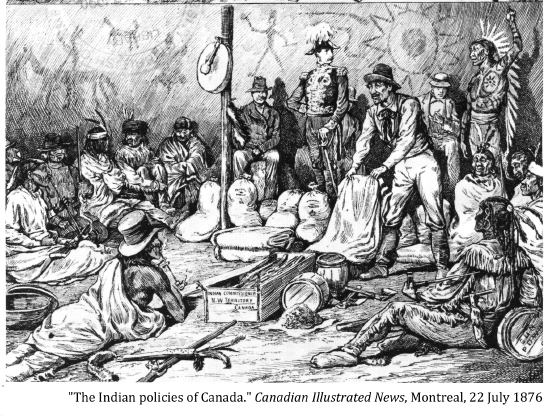
"One of the most persistent myths that Canadian historians perpetuate is that of the honorable and just policy Canada followed in dealing with the Plains Indians."
John L. Tobias, Canada's Subjugation of the Plains Cree, 1879-1885

"Shall we allow a few vagrants (First Nations) to prevent forever industrious settlers from settling on unoccupied land."
Amor de Cosmos

The Indian War in the United States – The "Sitting Bull" council at Fort Walsh, British Territory, October 1877, James E. Taylor, artist, New York Public Library, b17168686

Fort Walsh, Saskatchewan, 1878; NWMP Headquarters until 1882. LAC e00812892
"If the Police had not come to the country, where would we be all now? Bad men and whiskey were killing us so fast that very few indeed of us would have been left today. The Police have protected us as the feathers of the bird protect it from the frosts of winter. . . I am satisfied. I will sign the treaty."
Chief Crowfoot, Blackfoot Crossing, 20 October 1877


Root, hog, or die - Christopher Columbus Bennett has discovered the true Indian policy, Harper's Weekly, Thomas Nast, 8 November 1879, LC2002706056 [Cartoon shows James Gordon Bennett, publisher of N.Y. Herald presenting armed Indians with farm implements labelled "Work or starve."]
"Thought about Indigenous peoples [by the government in the second half of the 19th century] focused on a simple binary: civilization and savagery with little of consequence between. From this it followed that if Indigenous people did not become civilized, and if, in a changing world it was no longer possible for them to be savage, then they would die out."
Cole Harris
[The Blackfoot] were selling their Horses for a mere song, eating gophers, mice, and for the first time have hunted Antelope and nearly killed them all off . . . Strong men were now so weak that some of them could hardly walk. Others who last winter were fat and hearty are mere skin and bone."
Indian Commissioner Edgar Dewdney, 1879
"On arriving there I found about 1300 Indians in a very destitute condition, and many on the verge of starvation. Young men who were known to be stout and hearty fellows some months ago were quite emaciated and so weak they could hardly work ; the old people and widows, who with their children live on the charity of the younger and more prosperous, had nothing, and many a pitiable tale was told of the misery they had endured."
Lt. Gov. Edgar Dewdney, Blackfoot Crossing, July 1879
AN ASTONISHING STATE OF THINGS AT WILLIAMS LAKE.
The natives said to be Starving AND THREATENING VIOLENCE.
Pathetic letter from an Indian Chief
"I am an Indian chief and my people are threatened by starvation. The white men have taken all the land and all the fish. A vast country was ours. It is all gone. The noise of the threshing machine and the wagon has frightened the deer and beaver. We have nothing to eat. We cannot live on the air, and we must die. My people are sick. My young men are angry. . . A war with the white man will end in our destruction, but death in war is not so bad as death by starvation. . . the white man . . . has piles of wheat and herds of cattle. We have nothing—not an acre. Another white man has enclosed the graves in which the ashes of our fathers rest, and we may live to see their bones turned over by his plough.! Any white man can take three hundred and twenty acres of our land and the Indian dare not touch an acre. Her Majesty sent me a coat, two ploughs and some turnip seed. The coat will not keep away the hunger; the ploughs are idle and the seed is useless because we have no land. . . THERE WILL BE TROUBLE SURE . . . We have nothing now and here comes the cold and snow. Maybe the white an thinks we can live on snow. . . "
William
Chief of the Williams Lake Indians.
The British Colonist 7 November 1879

"My people were hospitable and generous and shared what we had with the newcomers. We were quite prepared to share the land as well. But the newcomers were not satisfied with just sharing it. Despite the fact that many of them arrived preaching the Christian virtues of brotherhood and understanding and Christian emphasis on spiritual things over material things, their actions proved that what they wanted was to own and control the land and to control the minds and actions of my people as well."
Chief John Snow, These Mountains Are Our Sacred Places
"The Indians were faced with the sudden onslaught of a totally foreign agrarian culture. Because of the railway, the impact was instantaneous."
Pierre Berton, The Last Spike
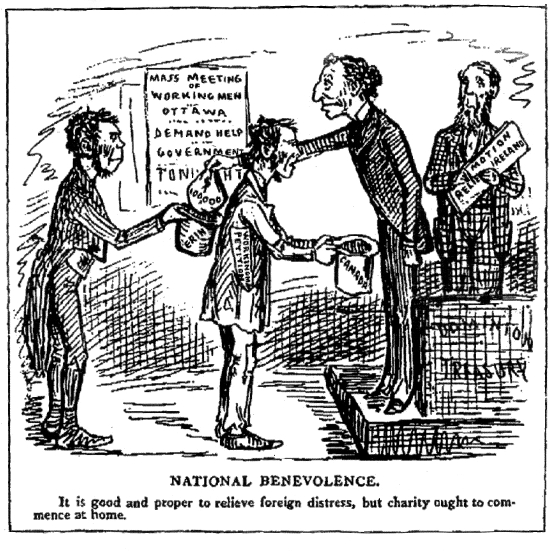
John W. Bengough, Grip, Toronto, 28 February 1880

Loafers and laborers. Uncle Sam- (At the end of his patience and his territory)
"Now, durn your pesky copper skins, you've got to work or jump.!" [with workers behind him] Puck, New York, Wales, 29 September 1880, LC 90714777

"If the Dominion Government intends to carry out a starvation policy with the Indians, then we will be no better than our cousins across the line, whom we condemn so lustily for their 'extermination' policy. We cannot allow the Indians to starve in our midst."
Prince Albert correspondent for the Saskatchewan Herald, 9 February 1880
"What for the Europeans was the gradual growth of settlement, economic expansion, material success, was for the Indian peoples a slow contraction of their country, social disintegration, a growing subjugation and the erosion of hope."
Stanley B. Ryerson, Unequal Union

"The Canadian government grudgingly fed the Indians over the winter of 1879-80 but did not want to make it an ongoing commitment. By the end of the 1870s Ottawa was already regretting the financial commitment it has assumed in the western numbered treaties . . . [In Victorian thinking] government assistance had to be kept to an absolute minimum . . . otherwise it would become addictive and promote laziness . . . Liberal Opposition constantly rebuked the Macdonald Conservatives for doing too much . . . This penny pinching ran contrary to the Indian understanding of the treaty relationship."
Bill Waiser, A World We Have Lost
"Those Reserve Indians are in a deplorable state of destitution, they receive from the Indian Department just enough food to keep soul and body together, they are all but naked, many of them barefooted . . . Should sickness break out among them in their present weakly state, the fatality will be dreadful."
Saskatchewan Herald, Battleford, 16 August 1880 [cited in James Daschuk, Clearing the Plains Disease Politics of Starvation and the Loss of Aboriginal Life]
"The life of an Indian woman in those early days was an extremely busy one. Packing and unpacking dogs and horses, making camps, providing wood, making and mending moccasins and wearing apparel, cooking, cutting, drying, and pounding meat, rendering grease, chopping bones to get out the marrow fat, making pemmican, stetching, scaping and dressing buffalo hides to make robes or leather."
John McDougall
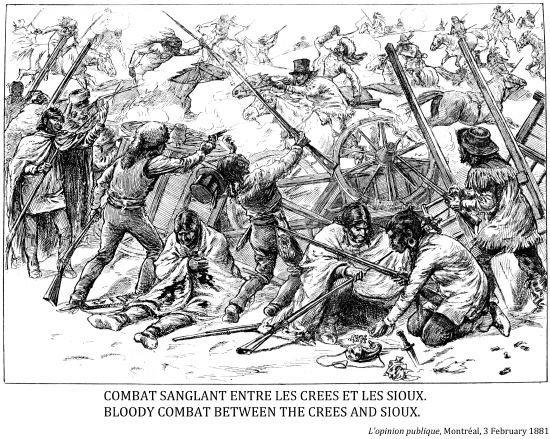
Puck, New York, 27 July 1881

Puck, New York, 27 July 1881

[Indigenous peoples have used plants and other natural materials as medicine. They have identified over 400 different species of plants with medical applications. This cartoon compares native medicines with the remedies snake oils salesmen sold at the time but at the same time suggests it is worth trying the native medicines. ]
Puck, New York, 4 August 1881

The Buffalo Dance of the Sioux at Fort Qu'Appelle. LAC, Acc. No. 1984-45-138, Sydney Prior Hall, 18 August 1881
"The typical American captivity narrative has been described as device for anti-Indian propaganda. At a time when Indians were an obstacle to frontier expansion, these atrocities were 'shaped by publishers exploiting a mass market that thrived on sensationalism, in a natural alliance with land speculators who wanted to implement a policy of Indian extermination in the interest of real estate development.'"
Sarah Carter, Capturing Women and James Levernier and Henning Cohen, The Indians and Their Captives [Today the word "captivity" is being used to describe First Nations children taken to residential schools or to foster homes.]

"Legislators of the day believed the remedy (for starvation) was to teach farmers to help themselves and to adopt habits of hard work, determination and sobriety. It was thought that if they were offered relief, the state would be rewarding pauperism, encouraging dependence and creating a permanent class of needy . . . a spirit of dependence would be implanted."
Sara Carter, Lost Harvests
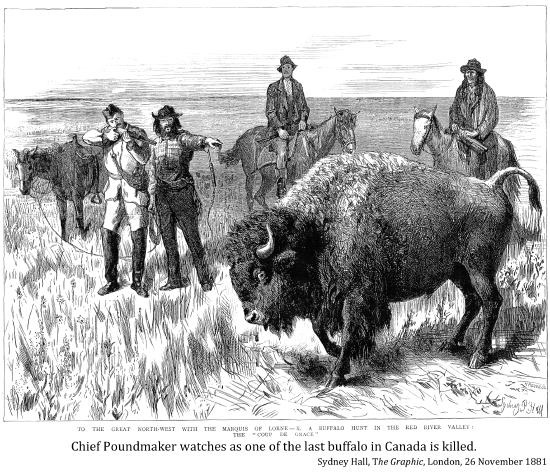
[In July 1881 Poundmaker acted as guide and interpreter during Governor-General Lord Lorne's tour of the Canadian northwest from Battleford to Calgary.]
"Neither side was prepared for the suddenness and finality of the collapse of herds in the late 1870s. The region-wide famine than ensued and the inability of authorities to provide adequate food relief ["feed one day starve the next"] sparked the widespread emergence of tuberculosis among immune-compromised communities."
James Daschuk, Clearing the Plains Disease Politics of Starvation and the Loss of Aboriginal Life
"It is pretty evident that the Indians have become pensioners upon the Public Treasury."
David Mills, former Liberal Cabinet Minister, House of Common Debates, April 1882
Government officials "are doing all they can, by refusing food until the First Nations are on the verge of starvation, to reduce expenses."
Sir John A. Macdonald, House of Commons Debates, 21 April 1882
"They [Indians] are a doomed race and it is only a question of how soon they well disappear."
Liberal MP Philippe Casgrain, House of Commons Debates, 9 May 1883

Buffalo bones gathered from the Prairies, Library and Archives Canada / PA-066544


[In 1883 Chief Piapot camped his people at [on?] the right-of-way of the CPR construction at Maple Creek.]
"Mr. MILLS (Liberal): The Indians have become pensioners upon the Public Treasury, that they are doing little or nothing for themselves. Now, I believe a barbarous population like the Indians may very easily be made wholly dependent upon the Government. . .
Sir JOHN A. MACDONALD (Conservative): When the Indians are starving they have been helped, but they have been reduced to one-half and one-quarter rations . . . It is true that Indians so long as the are fed will not work. . . . I am sure that the agents are doing all they can, by refusing food until the Indians are on the verge of starvation, to reduce the expense."
House of Commons Debates, April 27, 1883



"Well, my friends, I have some advice to give you today. Let the white people pass through Lacombe [upon hearing that the Blackfoot were blocking the CPR] dispatched telegrams to Van Horne, Donald A. Smith, and Edgar Dewdney. The answers were not long in coming; nobody wanted another Custer-style massacre. The orders went straight to End of Track; cease all work until the Indians are placated. Lacombe was asked to appease them any way he could. . . [Lacombe told Chief Crowfoot that] 'The Governor himself will come to meet you. He will listen to your griefs; he will propose a remedy [land to replace the land used by the railway]. . . [Crowfoot ] consulted with Lieutenant-Colonel A. G. Irvine, the Commissioner of the North West Mounted Police, and asked him if he thought he, Crowfoot, could stop the railway. Irvine replied by asking Crowfoot if all the men in the world could stop the Bow River running."
Pierre Berton, The Last Spike.
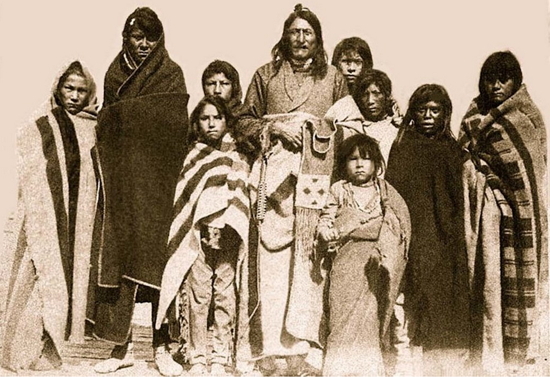
Chief Crowfoot with a group of children. In two years of the photograph being taken, all nine children, some of whom were his own, had died of tuberculosis. Robert Goldthorpe Brooks, 1884
"Clearing the land now called Canada and the United States of Indians to allow for white settlement and resource development has always been at the heart of federal, provincial and state government Indigenous policy."
Chief Clarence Louie, Rez Rules
"[Indigenous reserves in BC were located] in many small reserves rather than a few large ones for a variety of reasons: the provincial government argued that small reserves would force Indigenous peoples into the workplace, there to learn the habits of industry, thrift, and materialism, this becoming civilized; and also to provide cheap seasonal labour for burgeoning industries . . . places that were most precious to Indigenous peoples such as their villages, grave sites, cultivated fields, and fishing sites – none of which requires much space."
Cole Harris, A Bounded Land Reflections on Settler Colonialism in Canada

THE WAIL OF THE MARTYR.
"THERE IS NO GETTING O-ON WITH LO! ALL I DID WAS TO WITHHOLD HIS FOO-FOOD AND BLANKETS, KICK HIM OUT OF HIS RESER-V-VATION, SELL HIM SAND FOR FLOUR, KEEP HIM DRUNK ON CHEAP WHI-HISKEY, AND NOW, JUST BECAUSE HIS PEOPLE ARE STARVING AND THERE IS NO REDRESS, HE GETS MA-MAD AND THER-REATENS TO STRIKE ME!"
Life, New York, 27 March 1884
3. Every Indian or other person who engages in or assists in celebrating the Indian festival known as the "Potlatch" or in the Indian dance known as the "Tamanawas" is guilty of a misdemeanor, and shall be liable to imprisonment ... and any Indian or other person who encourages ... an Indian or Indians to get up such a festival or dance, or to celebrate the same, ... is guilty of a like offence ..."
Indian Act, 19 April 1884
Potlatch law 1884
The history of the Potlatch Collection
umista.ca/pages/collection-history
"The cause of the discontent [in 1885] is no secret to any person living in the North-West. Promises made when the Indians were strong and the whites weak are not carried out now that the whites have become strong and the Indians weak."
Frank Oliver, Edmonton Bulletin, 14 June 1884
"After the disappearance of the buffalo, the bacon and the cakes made with some of the bad flour did not satisfy the appetite of the Indians. I saw the gaunt children dying of hunger, coming to my place to be instructed. Although it was thirty to forty degrees below zero their bodies were scarcely covered with torn rags. These poor children came to catechism and to school. It was a pity to see them. The hope of having a little morsel of dry cake was the incentive which drove them to this cruel exposure each day, more, no doubt, than the desire of educating themselves. The privation made many die."
Father Cochin, Reminiscences: A Veteran Missionary of Cree Indians and a Prisoner in Poundmaker's Camp

"The short-sightedness and absurdity of the order [Deputy Superintendent of Indians Affairs, Lawrence Vankoughnet's decision to reduce rations and institute other austerity measures in early1884] is . . . evidence of a lamentable ignorance of western Indian reservations and conditions."
Mounted Police officer Cecil Denny (Denny resigned), 1884
"In October 1884, the force (NWMP) was brought under the mandate of the Department of Indian Affairs. The administrative change marked a turning point in the relationship between the North-West Mounted Police and the aboriginal population of the northwest. Once regarded as the saviours of the indigenous population of the west, the police became the ambivalent agents of their subjugation."
James Daschuk, Clearing the Plains Disease Politics of Starvation and the Loss of Aboriginal Life

"Take our music and our dances and you take our hearts."
Poundmaker
"When you took the potlatch away from us, you gave us nothing to take its place."
Chief Scow
[Macdonald's food policy (providing Indians with agricultural implements, farm instructors and rations) was] "tending to make the Indians a dependent population instead of civilizing them and making them more self-reliant."
David Mills, Liberal critic, House of Commons, 1885
"We are training the Indians to look to us for aid . . . [and] teaching them to rely on us for everything."
Edward Blake, Liberal Party leader, House of Commons, 1885
"We do not worship the sun. The dance is an expression of the joy and ecstasy of a religious life, of being thankful for life, the beautiful creation, the rain, the sun, and the changing seasons. The medicine men or women performing the ritual express their gratitude to the Great Spirit for all these things and pray for a good future, health, strength and prosperity for the tribe."
Chief John Snow, These Mountains Are Our Sacred Places
"Those of us from residential schools were mentally crippled by the experience and clueless about what we were or were supposed to be. Most survivors left school in their teens or early 20s, and most didn't live long. They were trapped at age seven or slightly older in psychological, emotional and spiritual age. For many, it was difficult or impossible to recover. . . Almost all former students suffered from their experience. Many died early and tragically."
Theodore Fontaine, Broken Circle The Dark Legacy of Indian Residential Schools A Memoir
"I have seen Crowfoot and all the Blackfeet. All quiet. Promised me to be loyal no matter how things turn out."
Father Lacombe, 30 March 1885


"The women and girls [at Battleford] bought their liberty at the price of their hair which was cut off by Poundmaker."
[This cartoon is completely inaccurate. Poundmaker's band went to Battleford hoping for rations. The inhabitants thought they were under attack and moved to the safety of the fort before the arrival of Poundmaker's band.]


"The Indian contributes to the revenue just as well as the white man. He buys taxed goods, he wears taxed clothes, he drinks taxed tea, or perhaps excised whiskey, just as well as the white man; and according to the liberal principle (the Liberal party in 1885 opposed Macdonald's plan to expand the suffrage to some Indians), we are to have taxation without representation in the case of the poor Indian. . . I can remember how the benevolent abolitionists brought the uneducated slaves from the Southern States by the underground railway into Western Canada, where they got homes. And those men, although unaccustomed to freedom, although just emerging from serfdom, when they came to Canada and had lived here for three years . . . became voters. . . And here are Indians, aboriginal Indians, formerly the lords of the soil, formerly owning the whole of the country. Here they are in their own land, preventing from either sitting in this House, or voting for men to come here and represent their interests. There are a hundred and twenty thousand of these people, who are virtually and actually disenfranchised, who complain, and justly complain, that they have no representation."
Sir John A. Macdonald, Commons Debates, 30 April and 4 May 1885, pp. 1488, 1575.

"Nearly every Stó:lo adult male found employment in the construction of the Canadian Pacific Railroad between 1879 and 1885. BC Indian Commissioner I. W. Powell… 'paid out nearly $300,000 for Indian labour alone. Stó:lo men supplied the C.P.R. with timbers for bridges and tunnels, worked as labourers laying down rails, and assisted in the masonry work reinforcing hill-sides, among other tasks."
Keith Thor Carlson, ed. You Are Asked to Witness: The Stó:lo in Canada's Coast History
“We have done all we could to make them work as agriculturists; we have done all we could, by the supply of cattle, agricultural implements and instruction, to change them from a nomadic to an agricultural life … We have had a wonderful success; but still we have had the Indians; and then in these half-breeds, enticed by white men, the savage instinct was awakened; the desire of plunder -- aye, and, perhaps, the desire of scalping -- the savage idea of a warlike glory, which pervades the breast of most men, civilised or uncivilised, was aroused in them, and forgetting all the kindness that had been bestowed upon them, forgetting all the gifts that had been given to them, forgetting all that the Government, the white people and the Parliament of Canada had been doing for them, in trying to rescue them from barbarity; forgetting that we had given them reserves, the means to cultivate those reserves, and the means of education how to cultivate them -- forgetting all these things, they rose against us.”
Sir John A. Macdonald, 1885
"[Indians . . .] are simply living on the benevolence and charity of the Canadian Parliament and . . . beggars should not be choosers."
John A. Macdonald, 1885
“We acquired the North-West country in 1870. Not a life was lost, not a blow was struck, not a pound nor a dollar was spent in warfare, in that long period that has since intervened. I have not hesitated to tell this House, again and again, that we could not always hope to maintain peace with the Indians; that the savage was still a savage, and that until he ceased to be savage, we were always in danger of a collision, in danger of war, in danger of an outbreak. I am only surprised that we have been able so long to maintain peace -- that from 1870 until 1885 not one single blow, not one single murder, not one single loss of life, has taken place.”
Sir John A. Macdonald, 1885
"Poundmaker was tried and convicted on evidence that, in any ordinary trial would have ensured his acquittal without the jury leaving the box, but the prejudice against the Indians in the North-West was so great that he could not get a fair trial."
Lt. Col. George T. Denison, 1900
"I am not guilty (of waging war). ... I am glad of my works in the Queen’s country this spring. ... When my brothers and the pale faces met in the fight at Cut Knife Hill I saved the Queens’ men. ... Everything I could do was done to prevent bloodshed. Had I wanted war, I would not be here now. I would be on the prairie. You did not catch me. I gave myself up. You got me because I
wanted peace."
Pitikwahanapiwiyin (Poundmaker), 26 May 1885
"It [the participation of a small number of Indians in the Riel Rebellion] affected all Aboriginal people after the rebellion. For close to a century, to be an Indian was to be invisible, so far as the government and the majority of Canadians were concerned. . . Before the North West Rebellion, Canadians had seen them as 'our Indians' in an expression of national pride because of the relationship between the two groups was so much superior to its American equivalent. Afterwards, Aboriginal people came to be regarded as just 'the Indians' or, worse, as 'the Indian problem' – a complication, an irritant, a disappointment."
Richard Gwyn, Nation Maker. Sir John A. Macdonald

Indian Act and the Pass System
“No rebel Indians should be allowed off the Reserves without a pass signed by an I.D. official. The dangers of complications with white men will thus be lessened. & by preserving a knowledge of individual movements any inclination to petty depredations may be checked by the facility of apprehending those who commit such offences.”
Public Archives of Canada, RG 10, Vol. 37 10, file 19,550-3. Hayter Reed to Edgar Dewdney, 20 July 1885.
[The pass system was brought in as an emergency measure and was enforced until 1941, though the practice was never approved by Parliament.]

The Wasp, San Francisco, 29 August 1885
"He cannot visit a friend on a neighbouring reserve without a permit. He cannot go to the nearest market town unless provided with a permit. In what was his own country and on his own land he cannot travel in peace without a permit. He cannot buy and sell without a permit. He may raise cattle but he cannot sell them unless the government official allows. He may cultivate the soil but he is not the owner of his own produce. He cannot sell firewood or have from the land that is his by Divine and citizen right, and thus reap the result of his own industry unless subject to the caprice or whim of one who often becomes an autocrat."
Missionary John McDougall, 1902
"You think I encouraged my people to take part in the trouble. I did not. I advised against it."
Chief Big Bear, at his trial, September 1885
"The Plains Cree's reward for that loyalty [bands that remained loyal during the Riel Rebellion] was the imposition on them of the Indian Act, Canada's legislative instrument of colonization, under which Indian agents would direct the management of their affairs, their traditional recreations would be prohibited, and their children removed from them to be educated in residential schools in an all-out effort to destroy their culture and identity."
Peter H. Russell, Canada's Odyssey, p.168

James Smith (artist), Blair Stonechild and Bill Waiser, Loyal till Death and the North-West Rebellion

Grave of eight indigenous men hung at Battleford on 27 November 1885
[The largest mass hanging in Canadian history occurred when eight warriors were executed in Battleford in November 1885.]


Compliments of the Season - Canadian National Game, Lacrosse. Montréal, LAC Acc. No. 1985-61-179 Source: Attic Books, Marvin Post, London, Ontario., late 19th century
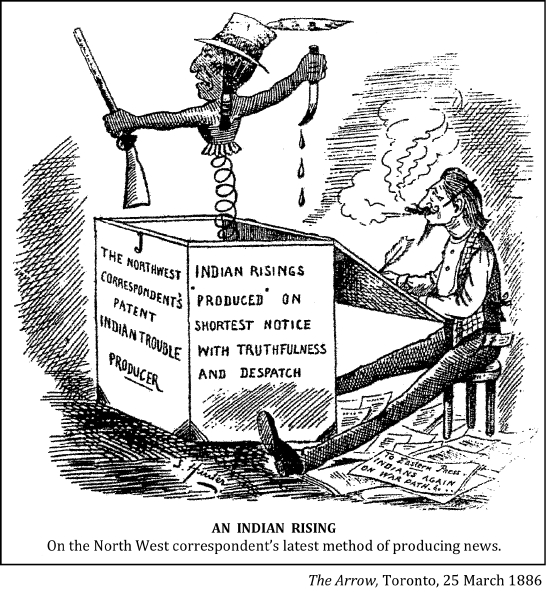
"[Saskatchewan'] settlers harboured racist views of Indigenous peoples due in part to misleading, sensational, condemning and often completely wrong coverage of their role in the resistance (in fact, Indigenous peoples honoured their treaties, and thus their participation in the resistance was negligible)."
Sarah Carter, Ours By Every Law of Right and Justice
"The great project of nation building, attendant on the building of the railway to British Columbia, was undertaken at a lasting cost to Canada's First Nations."
Dominic Hardy, Annie Gérin and Lora Carney
“It is a great loss to Canadian knowledge that, with the exception of Riel, western Native peoples were not able to tell us in their own written words the encounters and the facts of the invasion processes as these things happened to them.”
Emma LaRocque, When the Other is Me. Native Resistance Discourse 1850–1990
"It would be so much easier just to fold our hands and not make this fight . . . to say, 'I, one man, can do nothing.'
I grow afraid only when I see people thinking and acting like this.
We all know the story about the man who sat beside the trail too long, and then it grew over and he could never find his way again.
We can never forget what has happened, but we cannot go back nor can we just sit beside the trail."
Opeteca-hanawaywin (Poundmaker)
“Last year we asked for damages [for fires on his reserve caused by the CPR] but have yet received no answer. If this harm was done in the white man’s country it would be redressed.”
Chief Crowfoot
“In many things the white men were inferior to the Indians, and that they were white savages. [referring to poverty and pollution among other things]”
Red Crow and North Axe, remark after touring eastern Canada, 1886



John W. Bengough: https://en.wikipedia.org/wiki/John_Wilson_Bengough

John A. Macdonald stopped at the Blackfoot Siksika Reserve just east of Calgary on July 21, 1886, during his first trip by rail across Canada. He wanted to thank Chief Crowfoot for his support during the Rebellion of 1885. Crowfoot was wearing his oldest clothes, a sign of mourning for his adopted son Poundmaker, who had died on Crowfoot's reserve on July 4 after his early release from prison. Crowfoot discussed problems faced by his people, such as the fires started by the trains passing through his reserve. Historian Ged Martin, author of John A. Macdonald: Canada's First Prime Minister, states that "the event was staged more to show Macdonald as a benign ruler than to engage with Native grievances."
Samuel Hunter: https://en.wikipedia.org/wiki/Sam_Hunter_(cartoonist)

"At eight o'clock the Indians all gathered, men, women and children, some 500 or 600. Sir John Macdonald met them here at the station. . .
Now Crowfoot stepped forward. . . bowed, took hold of Sir John's hand and called him 'another Brother in law' . . . Crowfoot reminded Sir John of the telegrams which passed between them during the rebellion last summer. Lifting his right hand and assuming a look of great solemnity, Crowfoot said 'when that telegram was sent it was sent with a good heart. . . My people are loyal and want to be friendly with the whites.'. . . I suppose you have heard that we suffered from the fires made by the railway last fall. I had difficulty saving my horses last winter, and hope something will be done to prevent the Reserve being burned over again his summer. . .
We hope that rations will not be stopped. . .
Sir John said that of course the Government expect, by their work, they would be able to raise something for themselves, and the Government expect that year after year they would raise more and more, and in the meantime, while they were doing their best, the Government would see that none of them suffered; but he urged them to work and to endeavour to raise food for themselves. . .
The presents brought by Sir John were then distributed, teas, pipes, tobacco, calico. . ."
The Regina Leader, 26 July 1886
"At Gleichen the Indians assembled in force, and a great pow-wow was held in our honor. . . The Indians were marshaled under Crowfoot. They were gorgeous in war paint and feathers, with the exception of Crowfoot. He was in mourning for Poundmaker, who had recently died, and for that reason appeared in undress, which consisted of a little more than a dirty blanket round his loins. The Indians began by smoking a filthy-looking pipe, which they passed from one to another, each warrior merely taking whiff or two.
Crowfoot, being invited to state his grievances, began by alluding to the prairie fires caused by sparks from the railway engines, against the continuance of which he strongly protested. He then passed on to the great question of food, which is the staple grievance of the Indians. . . [Crowfoot] said that his people were originally happy and free with plenty of food at all times., that the white man had come in, taken their land, killed off the buffalo, thus depriving them of their means to live, and so forth. . . Crowfoot went on to protest his loyalty, which he had already proved in the rising of 1885. . . Sir John . . . provided a banquet for the occasion together with the present of pipes, tea and tobacco, this picturesque gathering terminated."
Sir Joseph Pope, [Sir John A. Macdonald's private secretary], Sir John A's First and Only Trip to the West, Maclean's Magazine, 2 January 1960. [This account is drawn from Pope's diaries and other reflections.]

LAC, PA-050799, 1887
"Promises by government people were like the clouds, always changing."
Chief James Seenam
"The great aim of our legislation has been to do away with the tribal system and assimilate the Indian people in all respects with the other inhabitants of the Dominion as speedily as they are fit to change.”
John A Macdonald

[In 1885 Sir John A. Macdonald's Franchise Act gave all adult Indians living in eastern Canada the right to vote without, as in the past, having to give up in exchange any of their special rights as Aboriginals. The Act lasted until 1898 when the franchise was taken away by the Laurier government. Few First Nations people used the ballot.]
The Acts commonly known as the Gradual Civilization Act of 1857 and the Gradual Enfranchisement Act of 1869 were almost uniformly aimed at removing any special distinction or rights afforded First Nations peoples and at assimilating them into the larger settler population. This was initially meant to be accomplished by the Gradual Civilization Act through voluntary enfranchisement (i.e., a First Nations person would relinquish their status in exchange for land and the right to vote), but only one person voluntarily enfranchised.
The Canadian Encyclopedia


Liberal fold. Conservative butcher shop.
The Six Nations redskin sheep are not voting the way Macdonald would like them to.
Le canard, Montréal, 18 September, 1886.


Inland Sentinel, Kamloops, 25 February 1888



ABORIGINAL SUSCEPTIBILITY
MAN-WITH-FRAYED-EAR: What for you cry?
MAN-AFRAID-OF-RED-HEADED-H0RSE: Injun think what dam sham he's Injun!
Puck, New York, 25 July 1886
"Our religion seems foolish to you, but so does yours to me."
Sitting Bull, 1889

NOS BONS MINISTRES D'OTTAWA
La Vie Illustrée, (Illustrious Life), Montréal, 11 May 1889
[Sir John A. Macdonald was the minster in charge of Indian Affairs for over nine years from 1878-1888.]
"In 1889 the federal government imposed the Peasant Farming Policy. . . to placate the non-Indigenous famers. . . Indigenous farmers were prevented from using modern farming equipment and required to make any implements they needed themselves. They could only seed by hand, harvest with scythes, bind by hand, thresh with flails, and grind grain with hand mills."
Michelle Good, Truth Telling

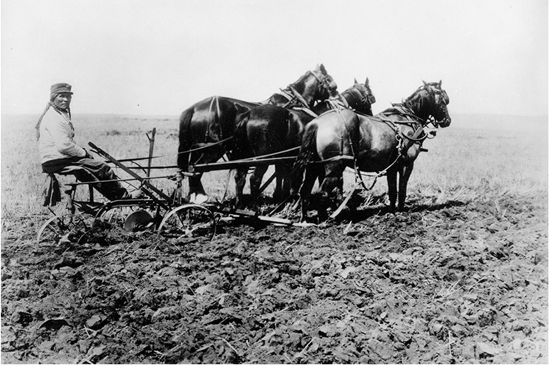
Indian ploughing on reserve, 1920, Library Archives Canada PA-048475
"A few years hence there will be no Indians. They will exist for posterity only in waxwork figures and in a few scant pages of history. However, brave and game they might be, there is nothing for them in the end but death."
Emily Murphy, 1910 [cited in Sarah Carter, Ours by Every Law of Right and Justice, p.146]

Oblates, City of Vancouver Archives

Le dernier Indien, The last Indian, Atelier Philippe He´bert, vers 1890,
National Archive of Quebec


"IT DON'T MAKE ANY DIFFERENCE TO US WHAT WAS PROMISED YER! WE WANT THE LAND AN' YER'LL HAVE TER LEAVE. IF YER STARVE – THAT'S YER OWN BUSINESS!"
Life, New York, 8 January 1891
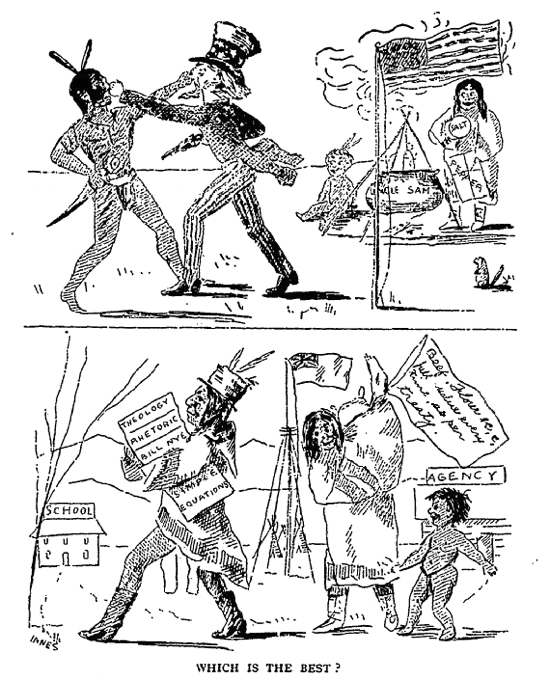
WHICH IS THE BEST?
USA: Uncle Sam. Salt. Pepper.
Canada: Beef, flour, full value every time as per treaty. Theology. Rhetoric. Bill Nye [Edgar W. Nye was an American superintendent of schools, journalist, humorist and speaker] Simple Equations.
John Innes, The Prairie Illustrated, Calgary, 10 January 1891

Life, New York, 26 February 1891

Life, New York, 26 February 1891

Life, New York, 26 February 1891



Ein Dorf der Haida Indianer an der Nordwestküste von Nordamerika. Rudolf Cronau, 1892

The Graphic, LAC R9266-1445, Peter Winkworth Collection of Canadiana, 22 October 1892

Sans Merci. Without Mercy. (A farmer is fighting a native in mortal combat in a grainfield. It depicts the struggle of civilization against savagery.), Louis-Philippe Hébert, 1893
“The third clause provides that celebrating the “Potlatch” is a misdemeanour. This Indian festival is debauchery of the worst kind, and the departmental officers and all clergymen unite in affirming that it is absolutely necessary to put this practice down.”
Sir John A. Macdonald, 1894
"Master of woodcraft, he [the Indian] was seen at his best when hunting. Upon the war-path he was cruel, tomahawking, scalping and torturing with fiendish ingenuity. A stoic fortitude when himself tortured was about his own heroic quality. In his village among his own clansmen he spent his time gambling, story-telling, or taking part in some rude feast. In his domestic life the Indian was not without virtues, and his squaw and papooses were treated with somewhat rough and careless kindness. To his tribe he was usually faithful, though to his foes false and crafty. Indian religion was purest superstition."
W. H. P. Clement, History of the Dominion of Canada, 1895 [The textbook chosen for use in classrooms from sea to sea.]

Sun Dance, Cree Warriors, Battleford. LAC PA-028833, Geraldine Moodie, June 1895 [The Sun Dance was forbidden under the Indian Act of 1885. The ban was generally ignored and dropped from the Act in 1951.]


Dictionary of Canadian Biography
"Almighty Voice was the champion of a race that is 'up against' it in civilization. The wonder is that not an occasional brave cuts loose, but that all braves do not prefer the sudden death to the slow extinction of their race."
Editorial, Evening Telegram, Toronto, June 1897
"[the story of Almighty Voice] has been told from the non-Indian perspective . . .one sided, one dimensional story . . . [that] smacks of colonialism. . . . [changes in the story are the result of] rereading of traditional sources through different lenses . . . Canada's assimilationist Indian policies were increasingly questioned after the Second World War . . . [Indian Affairs department records] were biased, prepared and written for the dominant settler society."
Bill Waiser, In Search Almighty Voice Resistance and Reconciliation
"The last stand of the North American Indian against the white man ended in a popular grove near Duck Lake in what is now the province of Saskatchewan on a Sunday morning in May of 1897. In that popular grove were the three Cree Indians, Almighty Voice, his brother-in-law Topean and his teenaged cousin Going-Up-To-Sky. . . [nearby] Spotted Calif, Almighty Voice's mother [sang] the Cree Death Song, chanting of his skill and courage and urging him to die bravely."
The Sheaf, Saskatoon, 1971
The Cattle Thief [Almighty Voice] by Pauline Johnson
"You have cursed, and called him a Cattle Thief, though
You robbed him first of bread . . .
How have paid us for our game? How paid us for
our land? . . .
When you pay for the land you live in, we'll pay you for
the meat we eat.
Give back our land and our country, give back our
herds of game . . .
And blame, if you dare, the hunger that drove him to
be a thief."

WHERE WOULD WE BE? – IF THE REAL AMERICANS HELD LODGE'S VIEW OF IMMIGRATION THERE WOULD BE NO LODGE BILL NOW – NOR ANYTHING ELSE.
[Congressman Lodge (right) was proposing an Act to prevent the country from being overrun by foreigners.]
Puck, New York, 30 March 1898

Puck, New York, 30 March 1898

Public Notice. LAC June 1898

Buffalo Bill's Wild West and congress of rough riders of the world A congress of American Indians (...). 1899, Library of Congress, Public domain, via Wikimedia Commons
"Settler colonialism involves displacing Indigenous peoples from their land and replacing them with expatriate settlers. Its underlying impulse is to eliminate Indigenous peoples from ownership of valuable resources, particularly land and to elevate settler families as legitimate and therefore entitled to land. Settler women's reproductive labour was central to the process of repopulating what were once Indigenous lands in Canada. Residential schools and other strategies, including restricting the franchise to settlers, also eliminated the power and cultures of Indigenous peoples. . . Settler women were complicit in the dispossession of Indigenous land."
Sara Carter, Ours By Every Law of Right and Justice Women and the Vote in the Prairie Provinces




The division of the land. The Colonies conquered by Europe. The England share. The English Colonies
Le monde illustré, Montréal, 14 December 1901
"Colonialism is the invasion and occupation of other lands for the purpose of settlement and/or acquiring resources."
Gord Hill, The 500 Years of Indigenous Resistance Comic Book
"Land is literally at the heart of the colonial objective. . . Colonial Indian policy was similar throughout the Americas: (1) acquire Indigenous lands and resources. . . and (2) get rid of the Indian problem through either elimination or assimilation."
Pamela Palmater, The 500 Years of Indigenous Resistance Comic Book

"Taking them altogether, the British Columbia Indians are remarkably industrious, enterprising, self-reliant, honest, sober and law-abiding. They are good neighbours."
Department of Indians Affairs, Annual Report, 1902.

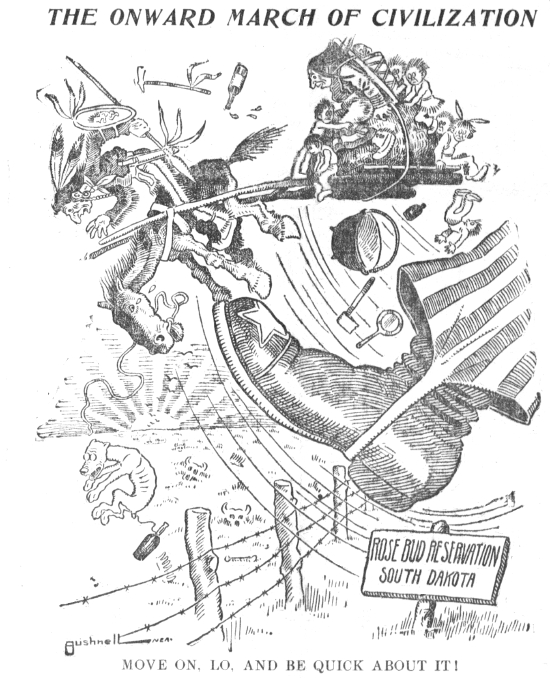
[Land taken from the Sioux was sold to settlers for $3.00 an acre.]
E. A. Bushnell, The Tacoma Times, 13 May 1904
"The [Native] race is one which is liable to disappear. It was not apparently made for the conditions under which we live in this modern world, and fades away, more or less under the influence of modern civilization."
Walter Scott, Premier of Saskatchewan, 1905
"If it becomes a question between Indians and whites, the interests of the whites will have to be provided for."
Frank Oliver, Minister of the Interior

Newton McConnell, Daily News, Toronto, 1906
[Superintendent General of Indian Affairs Hon. Frank Oliver portrayed as a bandit for the way he handled a reserve surrender. "[Oliver] was a blatant racist . . . He regarded First Nations as an inferior race, who had no place in the new society taking place on the western plain." Bill Waiser and Jennie Hansen, Cheated The Laurier Liberals and the Theft of First Nations Reserve Land.]
"The interests of the people must come first [when discussing the surrender of Indian reserve lands] and if it becomes a question between the Indians and the whites, the interests of the whites will have to be provided for."
Frank Oliver, House of Commons Debates, 30 March 1906

WITCH DOCTOR
CROSBY TEACHING INDIAN CHIEF
Thomas Crosby, Among the An-ko-me-nums, Missionary to the Indians of British Columbia, Toronto, 1907
"Canada's First Nations had a treaty right to reserves, a solemn promise by Indian Commissioner Alexander Morris that they were 'inviolate so long as the grass grows and the sun shines.' But the Laurier government broke this treaty promise by embarking on a concerted campaign to take away reserve land. Twenty-one percent of prairie reserves (one in five acres) was surrendered between 1896 and 1911. . . So much for the honor of Canada."
Bill Waiser and Jennie Hansen, Cheated The Laurier Liberals and the Theft of First Nations Reserve Land.

Judge, New York, 18 September 1909

[In 1911 Prime Minister Laurier passed legislation making it possible to legally remove the residents from an Indian reserve without their consent when they lived wholly or partly within an incorporated town. Despite their objections, each member of the Songhees reserve was given new land at nearby Esquimalt and paid $10,000.]


Sun Dance, Blackfeet Indians. LAC C-014106, John Woodruff, 1908.

Life, New York, 15 February 1912

Maclean's Magazine, Toronto, 1 May 1913

Maclean's Magazine, Toronto, 1 May 1913

tuberculosis, New York, Miscellaneous Items in High Demand, PPOC, 1910, Library of Congress, Public domain, via Wikimedia Commons
Memorial to Sir Wilfred Laurier 1910, Kamloops - Skeetchestn Indian Band
http://www.skeetchestn.ca/files/documents/Governance/memorialtosirwilfredlaurier1910.pdf
"We find ourselves practically landless, and that in our own country, through no fault of ours. We have reached a critical point, and, unless justice comes to our rescue we must go back and sink out of sight as a race."
Written statement by a B.C. delegation that met with P.M. Robert Borden, 1912

Puck, New York, 1912


Indians at the "Stampede", Winnipeg, 1913. Patent and Copyright Office, LAC, PA-030064

[Nisga’a Land Committee formally lodged a Petition to His Majesty’s Privy Council in London, England in which they asserted their Aboriginal rights and ownership of their traditional territory.”] 13 May 1913

Life, New York, 3 July 1913

New Masses, New York, December 1913

Edification for the heathen, Luther D. Bradley, Chicago Daily News, 1914


Life, New York, 24 September 1914

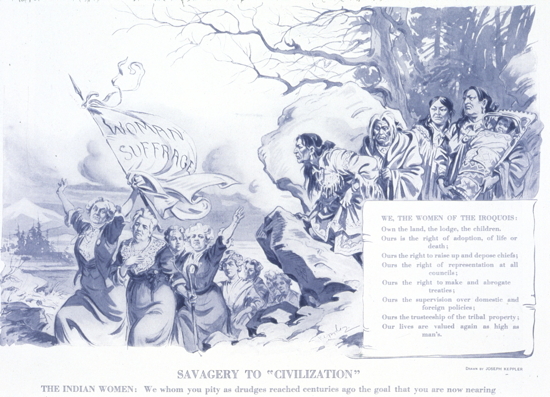
SAVAGERY TO "CIVILIZATION"
THE INDIAN WOMEN: We whom you pity as drudges reached centuries ago the goal that you are now nearing.
WE, THE WOMEN OF THE IROQUOIS:
Own the land, the lodge, the children.
Ours is the right of adoption, of life or death;
Ours the right to raise up and depose chiefs;
Ours the right of representation at all councils;
Ours the right to make and abrogate treaties;
Ours the supervision over domestic and foreign policies;
Ours the trusteeship of the tribal property;
Our lives are valued again as high as man's.
Savagery to "civilization", Puck, New York, Joseph Keppler, artist, 16 May 1914, LCCN97505624, Public domain via Wikimedia Commons.

Potlatch given by Bob Harris at Alert Bay, 1914. J. Welsh, Royal BC Museum, PN 2307-b

Dancers posing in potlatch regalia, Fort Rupert, 1914, Edward B. Curtis [Potlatching was made illegal in 1884. The law was enforced in 1921. Potlatching was made legal again in 1951.]
"They say that sometimes we cover our hair with feathers and wear masks when we dance. Yes, but a white man told me one day that the white people have also sometimes masquerade balls and white women have feathers on their bonnets and the white chiefs give prizes for those who imitate best, birds or animals. And this is all good when white men do it but very bad when Indians do the same thing."
Chief Maquinna, 1896

Une Veillée d'autrefois. LAC Acc. No. 1993-209-12, Edmond-J. Massicotte, 1915


Life, New York, 15 March 1915

"The fact that the period when many of these policies [helping First Nations people become farmers] were getting under way, 1883-1890, was among the worst climatically in prairie history compounded the problem."
J. R. Miller, Skyscrapers Hide the Heavens
"In the decade after 1885, government policies made it virtually impossible for reserve agriculture to succeed because the farmers were prevented from using the technology required for agricultural activity in the west . . .Indian agriculture was killed, it did not fail."
Sara Carter, Lost Harvests

Good Morning, New York, 22 October 1919

The Liberator, New York, March 1920

"Here were a people [Inuit] with less resources than any other people on earth, and yet they were the happiest people I have ever know."
Robert J. Flaherty, director, Nanook of the North, 1922
"In Canada, relocations were employed ostensibly to further the official goals – protection, civilization and assimilation – of Canadian Native policy."
Thomas King, The Inconvenient Indian, p.89


Judge, New York, July 1924

The Vanishing American, theatrical poster, USA, 1925

"From 1927 until the early '50s, there was a law in Canada that forbade Indians to raise money and hire lawyers to fight land claim suits. They had actually been shut out from using the law on the basis of race; this was a discriminatory law that would have done credit to the apartheid regime of South Africa."
Ronald Wright
"RECEIVING MONEY FOR THE PROSECUTION OF A CLAIM
141. Every person who, without the consent of the Superintendent General expressed in writing, receives, obtains, solicits or requests from any Indian any payment or contribution or promise of any payment or contribution for the purpose of raising a fund or providing money for the prosecution of any claim which the Tribe or Band of Indians to which such Indian belongs, or of which he is a Member, has or is represented to have for the recovery of any claim or money for the said Tribe or Band, shall be guilty of an offense and liable upon summary conviction for each such offence to a penalty not exceeding two hundred dollars and not less than fifty dollars or to imprisonment for a term not exceeding two months."
The Indian Act, 1927
[This section of the 1927 Indian Act placed an impossible burden upon Bands that wished to take legal action against the Crown or file a claim:]
"The 1927 Indian Act amendments, which were in force until 1951, brought about a shameful period in Canada's history. Our people were, by Canadian law, virtually forbidden to leave our reserves without permission from the Indian agent, who now controlled almost every aspect of our lives, and the courts were effectively cut off to us as an avenue for addressing a land claim against the government. Our reserves began to resemble the internment camps that were set up during the world wars for enemy aliens."
Arthur Manuel, Unsettling Canada A National Wake-up Call

Toronto Public Library, Baldwin Room, 1927



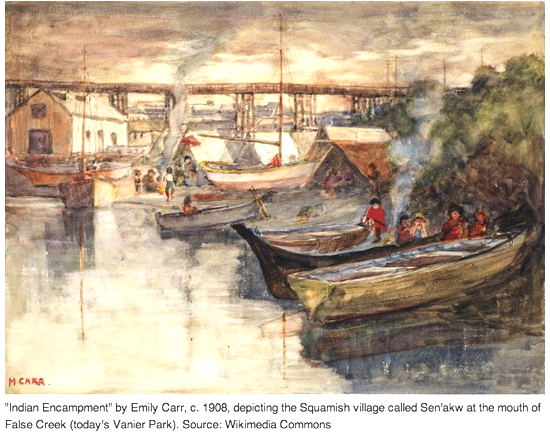

[In 1930 eight acres of a disputed Kitsilano Reserve were alienated for the present Burrard Street Bridge and in 1934 four acres were alienated for the Seaforth Armouries.]



"The Blackfeet were a proud, warlike and, as conditions then were, a numerous people [nearly 5,000]. They had been kings in their own right in their own country. Suddenly and without warning, they were plunged into the miseries of utter poverty. It was a testing time both for the Government of Canada and the Indians . . . The terms of the treaty did not take account of the sudden and overwhelming tragedy . . . Canada's occupation of the West is one of which Canadians may well be proud, both to meaning, method and achievement."
Hon. Frank Oliver, The Blackfoot Indian Treaty, Maclean's Magazine, 15 March 1931
"A white man, long ago, spoke to an Indian sitting on the large end of a log. 'Please, sit over!' he said. The Indian saw no harm in it; he move a bit and allowed the stranger to sit on the log beside him. The newcomer repeated, 'Sit over!' So he did. But it was not enough. 'Sit over, sit over!' The Indian before long found himself at the small end of the log. The white man declared, 'The log now is my own!'"
Marius Barbeau, "Our Indians – Their Disappearance", Queen's Quarterly, 1931
"Life has indeed been made 'easier' for them [Indians] since the introduction of the rifle, the steel axe and the iron pot, not to speak of clothing, castile soap and a decent language! Formerly they idled away their existence in squalor and crass ignorance. Their idiom was a mere growl from the throat Their tools were of stone and antler, and their artifacts fit only for a bonfire. Their companions were the animals of the forest or the prairies. Their dwellings were huts and movable tents, where they froze in winter and starved between seasons. In a word, they were uncivilized; they were savage men of the wilds with unaccountable ways of their own; they were heathens, the true wards of Satan, with no knowledge of God and his favourite son, the white man."
Marius Barbeau, Our Indians, Queen's Quarterly, 1931
"Requesting the Indian to exchange the skilful manipulation of pole, paddle, and snowshoe, in which his soul rejoices, for the drudgery of a shovel on a small backwoods farm, the first step in the reclaiming of which requires him to destroy the forest on which he looks as a home, is to ask an artist to dig graves."
Grey Owl, The Men of the Last Frontier, 1931

At a time when the First Nations population had dropped to 108,000 and many people thought they would not survive, Duncan Campbell Scott, Deputy Superintendent of the Dept. of Indian Affairs issued a report giving the false impression that First Nations were prospering. The cartoonist likely drew this sarcastic cartoon in response to his report.

Dr. Duncan Campbell Scott. LAC PA-165842/ e010752290, Yousuf Karsh, 16 Sept. 1933


Sko-Mish-Oath - the territory of the Squamish Indian People before the whiteman came, 1937, City of Vancouver Archives, AM54-kS13--Map 351b
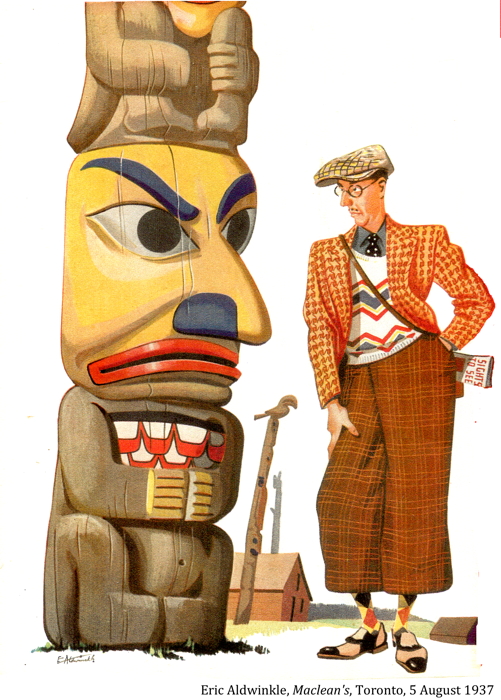





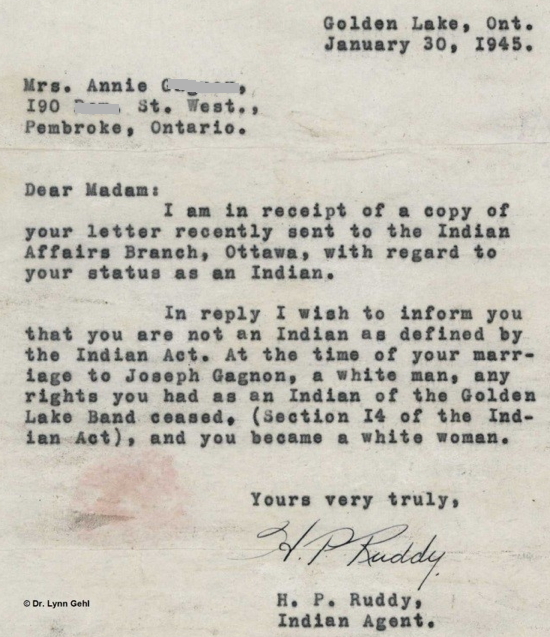
Loss of Indian Status, Active History, 30 January 1945


Dick Patrick
"When my people [First Nations] went into Vanderhoof, they were not allowed to go into restaurants, use public toilets, and had to come in the back door of a grocery store to buy groceries. We [Dick Patrick and King George] spoke for a long time about the injustice to my people. He told me he would endeavor to help my people."
Dick Patrick, awarded the Military Medal in 1944.
[After the war Dick was arrested, charged with disturbing the peace, and sentenced to six months in prison on nine different occasions for entering a restaurant in Vanderhoof that refused to serve First Nations people. He was never served a meal.
– see Eric Jamieson, The Native Voice, pp.103-05]
https://www.princegeorgecitizen.com/news/local-news/decorated-aboriginal-soldier-captured-enemy-position-single-handedly-1.2107254

The Leader-Post, Regina, 6 January 1945
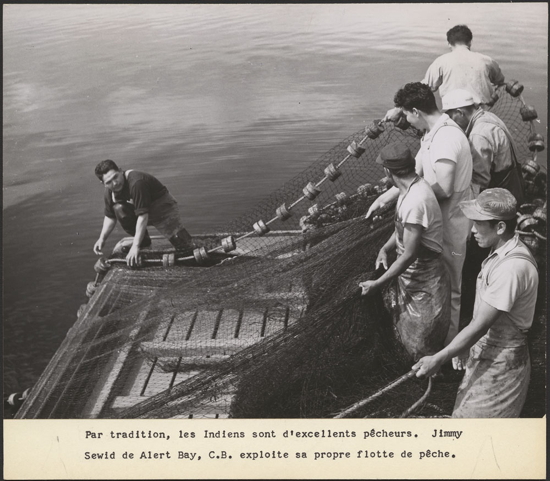
Jimmy Sewid and other fishermen from 'Namgis First Nation pulling in a fishing net. LAC /e011051640, Canada. Dept. of Manpower and Immigration

Indian women [First Nations] work with speed and skill in the canning of crabs in a factory located in Masset (B.C.). LAC Canada. Dept. of Manpower and Immigration
"One day back in Canada my buddies took me down to a hotel. I had been a soldier for one year and I had on my uniform. I went into the hotel with them and sat down and they would not serve me because I was an Indian. The law at that time was that they were not supposed to serve an Indian. Just think, I was a soldier."
Andrew George, 1946


Left to Right: Dr. P.E. Moore Director, Indian and Northern Health Services, Department of National Health and Welfare, Ottawa; Hon. Paul Martin, Minister of National Health and Welfare; W.G. Weir, M.P. for MacDonald, Manitoba; Dr. J.G. Fyfe, Director of the Brandon Sanitorium for Indians; Dr. E. Ross, Medical Director for the Manitoba Sanitorium Board; J.E. Matthews, M.P. for Brandon; and Dr. W.J. Wood, Regional Director of Indian and Northern Health Services for Manitoba. Photo taken at Brandon Sanitorium for Indians, Brandon, Manitoba, LAC

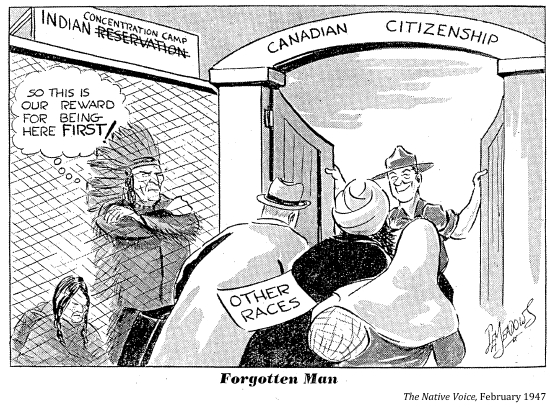


"I feel that in granting them the franchise, this Government has recognized a principle which should have been invoked long ago. These new voters are the only true Canadians; the rest of us came to this country from other lands."
Hon. Gordon Wisner, attorney general, 1949

[Frank Calder was born in the Nass River Valley in northern British Columbia in1915. At the age of 9 he attended a Methodist mission school at Coqualeetza for four years, a government funded residential school for four years and the Chilliwack high school for four years. He returned to the Nass Valley every summer to fish. Frank Calder was the first aboriginal to graduate from high school, to graduate from UBC, to be elected to any legislature or parliament and to be appointed a cabinet minister. He successful fought for title to Nisga's lands.]

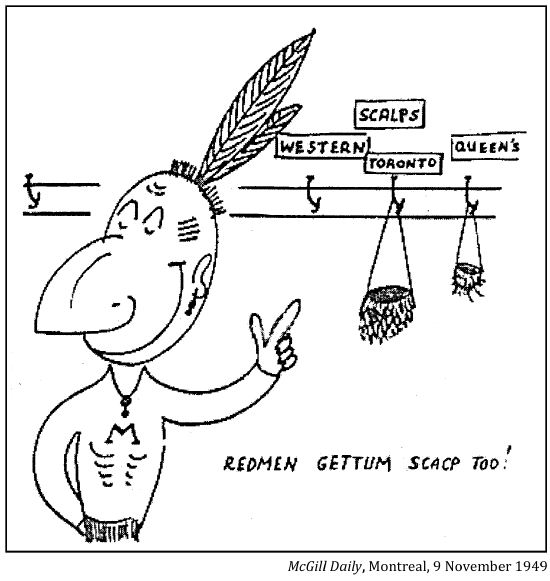





The annual Sun Dance ceremony at the Blood Indian Reserve, near Cardston, Alberta. [La cérémonie annuel «Sun Dance» à la Reserve indienne Blood, près de Cardston, Alberta.] LAC Copyright : Government of Canada, Gar Lunney, August 1953



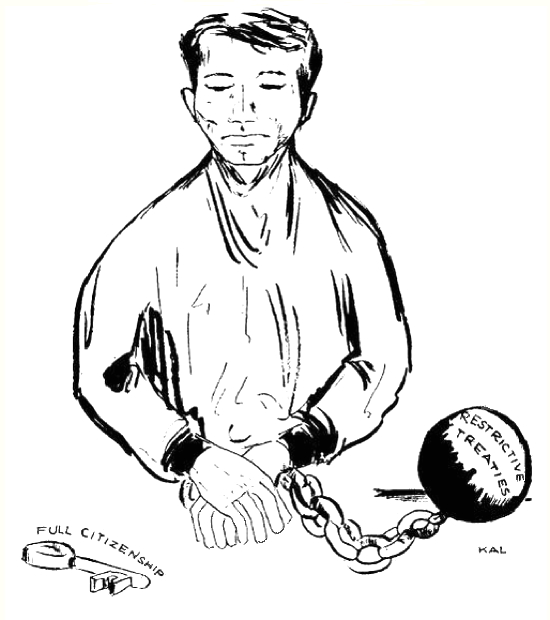
[The Indian Act prohibited the sale of alcohol to First Nations.]
Kal, The Gateway, Edmonton, 21 January 1955


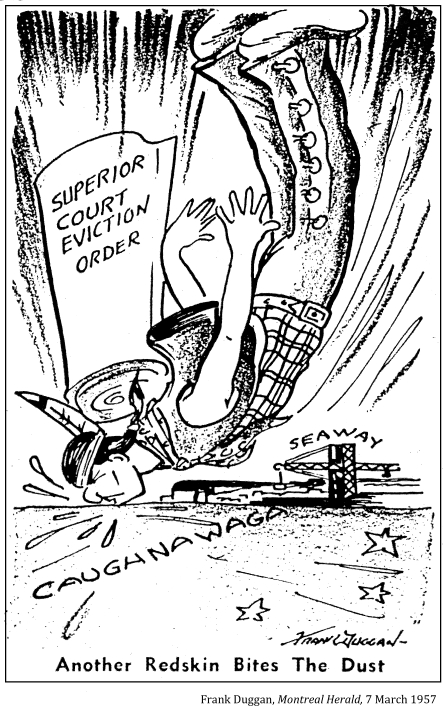

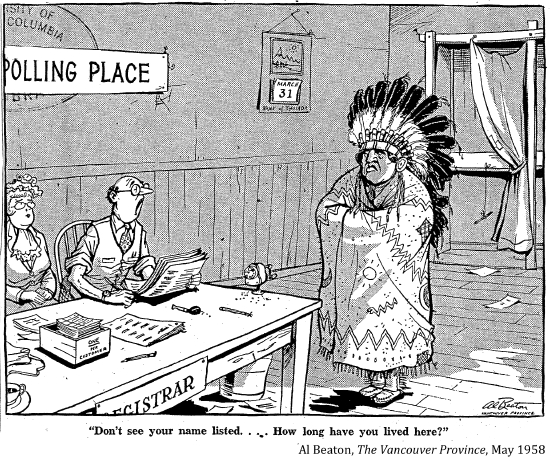


1960 In Hiawatha Council Hall on occasion of federal by-election. All First Nations living in the riding get to vote. LAC, PA-123915

Hereditary Chief Alfred Scow of Gilford Island became the first Aboriginal person in BC to graduate from law school in 1961.

"When you are in the mountains, you are as much a part of nature as the leaf that falls from the tree, the water in the creek, the rain from the sky. You are no greater than these, only part of it all:' As in the beginning, world without end!' Death is all around you, thousands of years of death, unmourned dead things absorbed into the making of new life."
Maisie Hurley, newspaper article (unknown paper and date); reprinted in The Native Voice, December 1962





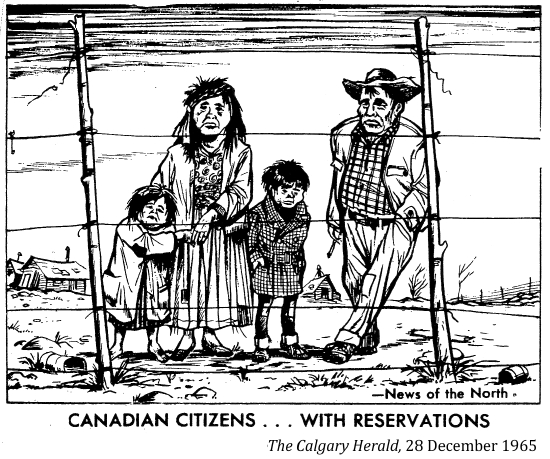
"Don't knock a man down and then ask why he lives in the dirt. Don't strip a man of his clothing and then ask why he is naked. Don't filch a man of his authority, his right to rule his home, his dignity as a man, and then ask him why his culture is substandard."
Chief Dan George, 1966

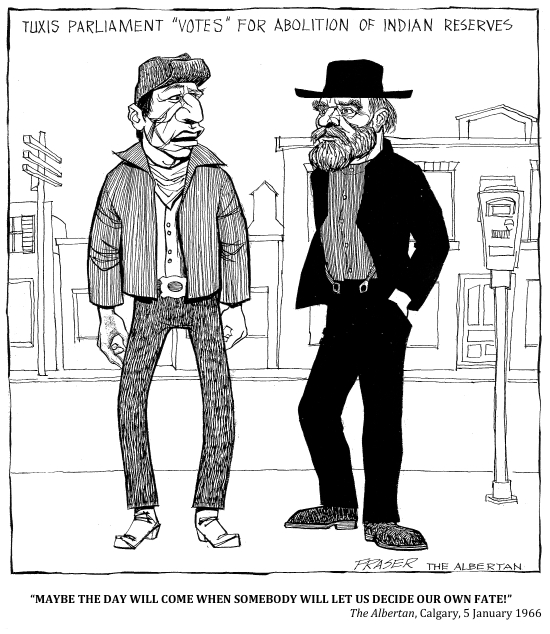






"The existence of Indian reserves and the poverty in them is a black eye in the Canadian Centennial year. The atmosphere on reserves is sick; brought about by a paternalistic attitude towards Indians."
Frank Calder, 1967
"In the long hundred years since the white man came, I have seen my freedom disappear like the salmon going mysteriously out to sea. The white man's strange customs, which I could not understand, pressed down upon me until I could no longer breathe. When I fought to protect my land and my home, I was called a savage. When I neither understood nor welcomed his way of life, I was called lazy. When I tried to rule my people, I was stripped of my authority.
My nation was ignored in your history textbooks–they were little more important in the history of Canada than the buffalo that ranged the plains. I was ridiculed in your plays and motion pictures, and when I drank your firewater, I got drunk–very, very drunk.
Oh Canada, how can I celebrate with you this centenary, this hundred years? Shall I thank you for the reserves that are left to me of my beautiful forests? Shall I thank you for the canned fish of my rivers? For the loss of my authority, even among my own people? For the lack of my will to fight back?"
Chief Dan George, Speech, 1 July 1967
"We, the Indians of the Yukon, object to . . . being treated like squatters in our own country. We accepted the white man in this country, fed him, looked after him when he was sick, showed him the way of the North, helped him to find the gold; helped him build and respected him in his own rights. For this we have received very little in return. We feel the people of the North owe us a great deal and we would like the Government of Canada to see that we get a fair settlement for the use of the land."
Elijah Smith, address 1968

Military Mohawk Princess, Toronto Star Archives, Toronto Reference Library tspa_0055581f, [Military Mohawk Princess: Kahn-Tineta Horn: last night angrily tells Robert K. Andras: minister without portfolio: that only Indians on the government payroll are being heard at the meetings on Indian policy Andras is holding across Canada. Miss Horn ambushed Andras in Lord Simcoe Hotel.]



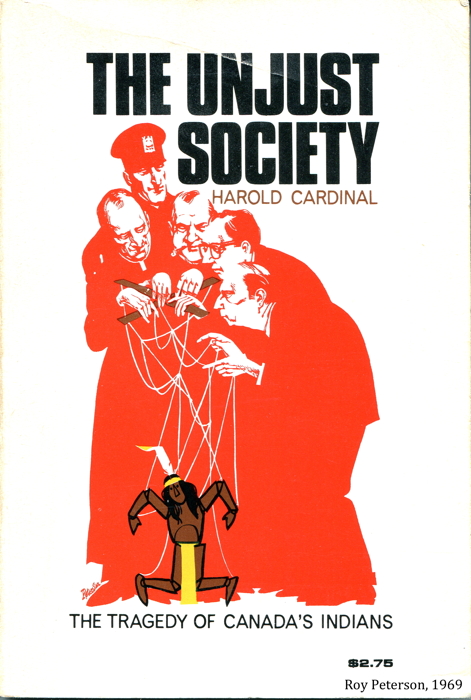
"Before I can be usefully participating and contributing citizen I must be allowed to further develop a sense of pride and confidence in myself as an Indian. I must be allowed to be a red tile in the Canadian mosaic, not forced to become an unseen and misplaced white tile."
Harold Cardinal
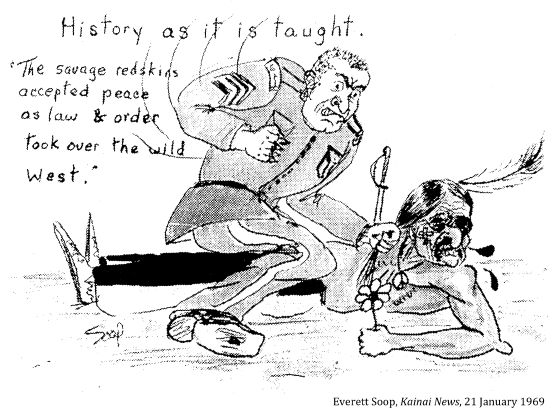


"Red Power is a viable alternative to many young Indians, and violence is not too remote. Anyone who has been stepped on long enough may reach the point where he says 'no more'."
Philip Paul, Chief of B.C. Tsartlip Band
"Don't ask me if there'll be racial violence. There is already is – against us. Now the question is whether we will fight back."
Dr. Howard Adams
"It's certainly weird that the most blue-blooded Canadians of all, the people who were here first, should be treated like refugees from steerage."
Kahn-Tineta Horn

"Unions discriminate against Indians trying to break out or reserve ghettos and get jobs in industry because Indians are not accepted as members. Local mines and construction projects are particularly hard places for Indians to gain employment."
Frank Calder, Vancouver Province, 13 March 1969
"Where are the Eskimo managers of Hudson's Bay posts? Where are the Eskimo police, the radio operators, the nurses? I'll tell you where they are. They are down at the welfare office drawing relief."
Duncan Pryde, Time, 2 May 1969

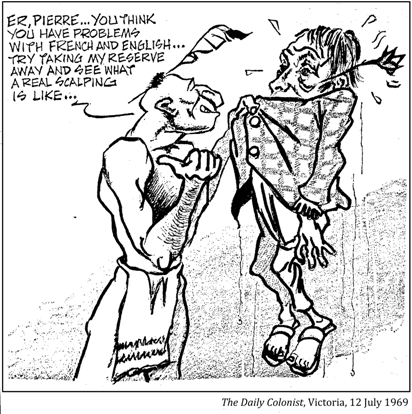
[Trudeau's White Paper was intended to bring about] "the destruction of a Nation of People by legislation and cultural genocide."
National Indian Brotherhood
"The federal government is not prepared to guarantee the aboriginal rights of Canada's Indians. It is inconceivable that one section of a society should have a treaty with another section of a society. The Indians should become Canadians as have all other Canadians."
Pierre Elliot Trudeau, speech at a Liberal dinner, Vancouver, 11 August 1969
[The White Paper was "a thinly disguised program of extermination through assimilation."
Harold Cardinal

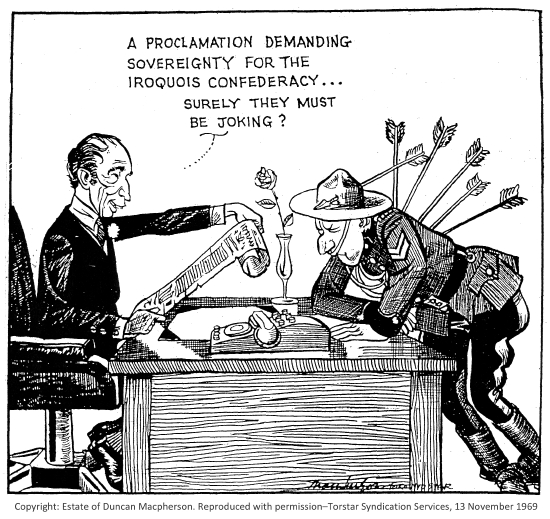
"The only good Indian is a non-Indian."
Harold Cardinal, The Unjust Society, 1969
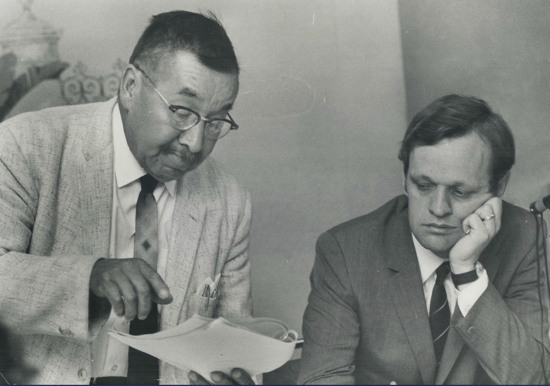
Indian Affairs Minister Jean Chretien Chief Wilmer Nadjiwon, Toronto Star Licence tspa_0037817f. 1969
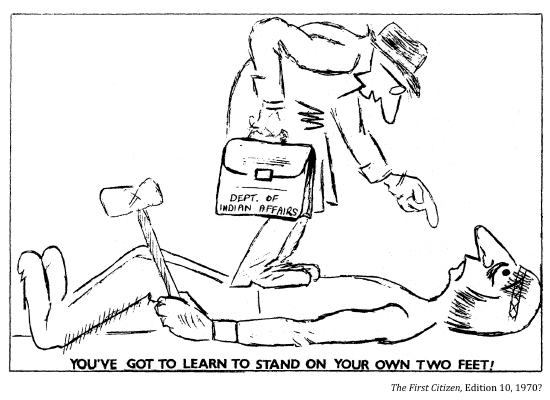










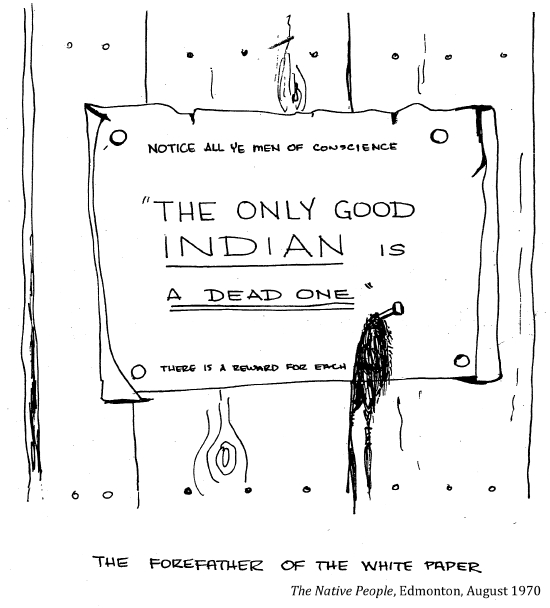


"Since our forebears first set foot on this continent, the white man has been taking from the Indians: his food, his source of livelihood, his traditional way of life. The only thing the white man has refused to accept is perhaps the most valuable thing he had to offer: his unique sense of values."
Joe Rosenthal, 1971


"Teachers from all over the world, from England, Denmark, Germany, the Philipines, from the United States and Africa. They stay for one year. . . The teacher will walk up to the school, open the door and, very often find that the basement has flooded. There is no oil. There is no electric light. There is no sign of school books or supplies. . . As the days passed, the teacher started to realize that there were more important things in the village than education and the school . . . The whole village was balanced so precariously between survival and disaster that learning was a form of leisure, having very little connection with the future. . . If the teacher survived the first year, he would develop an empathy with the people of the village. If he survived the second year, he would see the separate identities of each individual, the class structures, the feuds, the family solidarities and jealousies. He would feel the strength of the community, the steel blade of a culture normally hidden by the mists of prejudice and prejudgment. If he survived the third year, he would begin to hate his own selfish society."
John Gibson, employed by the Department of Social Welfare on the BC coast, A Small and Charming World, 1972

New Breed, Regina, December 1971

"People less strong would have surrendered . . .watching ethnic murder as their children were absorbed into the educational machine. . . If Donna's aunt drives into town she will have to accept humiliation and discrimination for she will not be permitted to rent a hotel room; she will not be served in restaurants. . . The white man's acquired sense of superiority is as ruinous and overwhelming as a Panzer column."
John Gibson, employed by the Department of Social Welfare on the BC coast, A Small and Charming World, 1972
"Unfortunately for my people, the legislators turned a deaf ear. The dam [Bighorn Dam, Alberta] was built and much of the Stoneys' traditional hunting grounds–land to which we believe we had a valid claim under treaty seven–now lies under a twenty-seven-mile-long artificial lake. . . Homes were swept aside by heavy machinery, graves turned over or some graves moved to a new site. . . Even more far-reaching in its results was the almost complete disappearence of game from the area."
Chief John Snow, These Mountains Are Our Sacred Places


Micmac News, Sydney, March 1972






"What for the Europeans was the gradual growth of settlement, economic expansion, material success, was for the Indian peoples a slow contraction of their country, social disintegration, a growing subjugation and the erosion of hope."
Stanley B. Ryerson, 1973

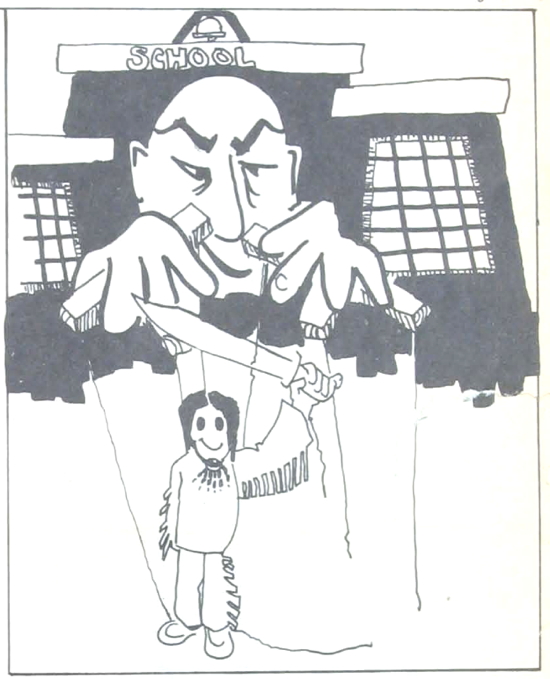
New Breed, Regina, March 1973





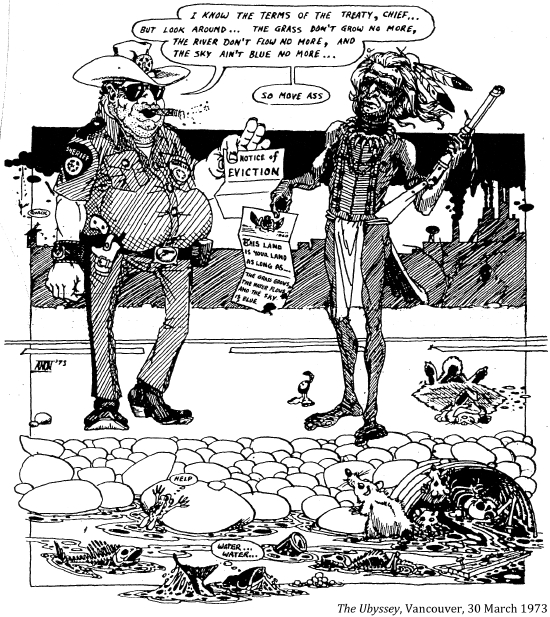



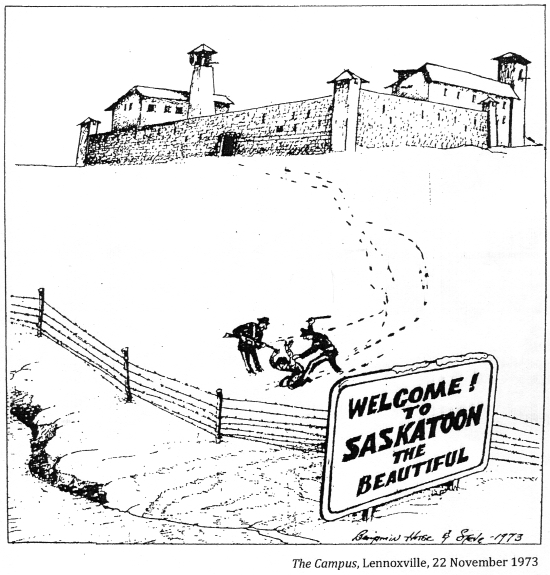

Kenora Park, Toronto Star, Dick Darrell, 1974


[Treaty payments should be over $100 in today's dollars.]








The Manitoban, Winnipeg, 4 November 1974

The Toronto Star, 1975


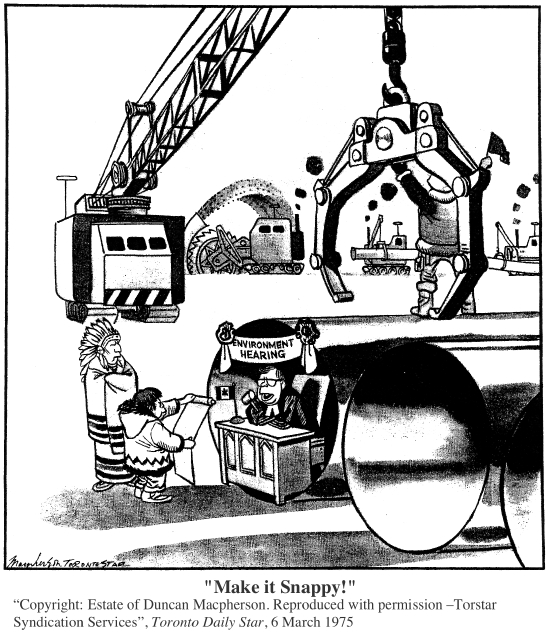
"We the Dene of the Northwest Territories insist on the right to be regarded by ourselves and the world as a nation."
Dene Declaration, 19 July 1975
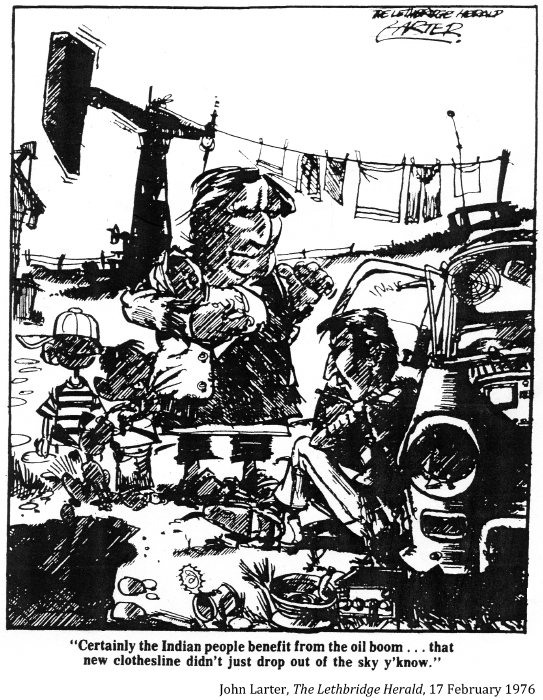




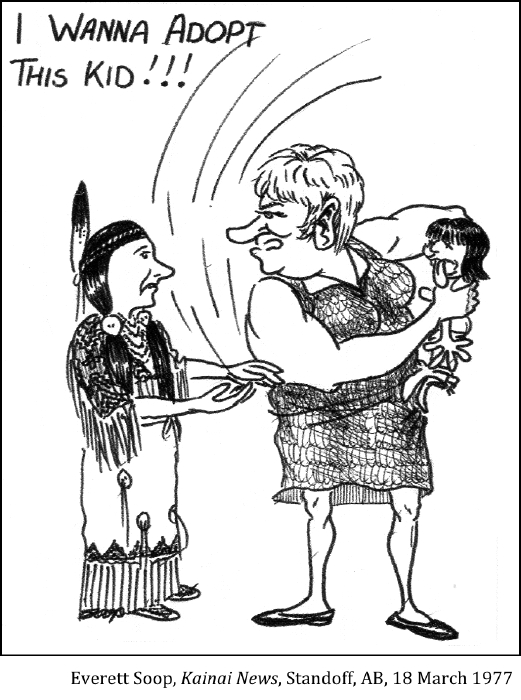

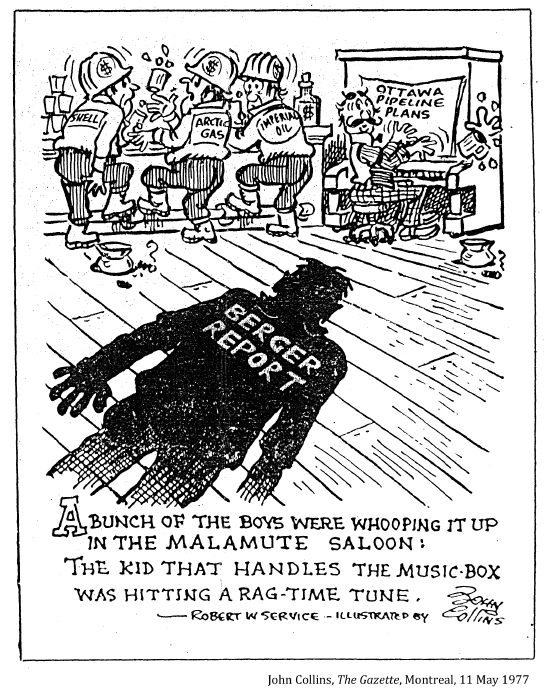


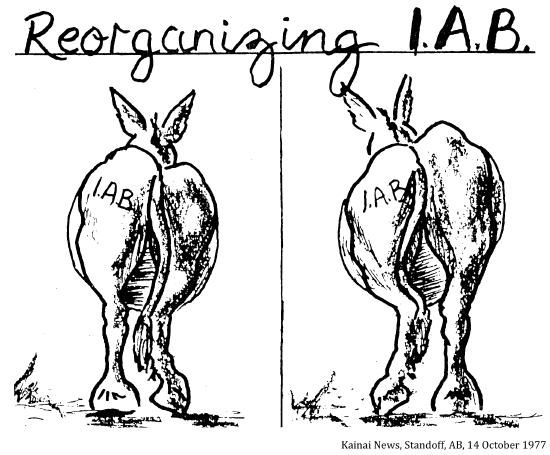

Billy Brass, "Roots of Survival," 17 December 1977, printed in The Sheaf, Saskatoon, 27 November









Nicola Indian, September 1979

Everett Soop, LAC Acc. No. 1993-200-24 [P. M. Trudeau and Minister of Indian Affairs Hugh Faulkner], January 1979


"The attitude that there are only two 'founding' cultures in Canada is typical of the colonialist, and even racist, attitudes which Native Canadians are forced to contend with."
Harry W. Daniels, 1979
"The real issue is not whether technology is good or bad but rather whether or not the native people are going to have access to the decision making process. The question is not whether there is going to be any development in the north, the question is: are native people going to help decide what kind of development is going to take place."
Duke Redbird, 1980

Indian Child Caravan, caravan.ubcic.bc.ca, 1980


[The Constitution Express train trip from Vancouver to Ottawa protested the lack of aboriginal rights in the proposed constitution. Over 1000 people took the train to Ottawa. Nov. 1980]
https://indigenousfoundations.arts.ubc.ca/constitution_express/



Constitution Express, 11 April 1981



What! It doesn't hurt them, Mr. Lessard said so.
Roland Pier, 1981 06 00, LAC
[Minister of Fisheries Lucien Lessard ordered the Québec provincial police to make a series of raids on Mi'kmaq salmon fishermen at Restiguiche in order to stop them from asserting their control over native fishing. Traditionally the Mi'kmaq relied on salmon as a source of food and income.]

"The government sent in 500 police to arrest the natives. The government reaction to the 'Salmon War’ is now regarded as having been too harsh."
The Star, Toronto, 1981 06 11
[Thanks to a number of court decisions the Mik'maq are now in charge of the river and are fishing commercially.]



"Thousands upon thousands of Indian Affairs bureaucrats have enjoyed a comfortable lifestyle and retired to a healthy pension while the people they were well paid to serve suffered in Third World conditions under their care."
Chief Clarence Louie, Rez Rules

Innes, Calgary Herald, 18 November 1981


"25. The guarantee in this Charter of certain rights and freedoms shall not be construed so as to abrogate or derogate from any aboriginal, treaty or other rights or freedoms that pertain to the aboriginal peoples of Canada including
• (a) any rights or freedoms that have been recognized by the Royal Proclamation of October 7, 1763; and
• (b) any rights or freedoms that now exist by way of land claims agreements or may be so acquired"
35. The existing aboriginal and treaty rights of the aboriginal peoples of Canada are hereby recognized and affirmed. (2) In this Act , 'aboriginal peoples of Canada' includes the Indian, Inuit and Metis peoples of Canada."
Charter of Rights and Freedom 1982
"In my view, the entrenchment of Aboriginal rights in the Constitution Act was a moment of great opportunity for Canada. It was then that we should have seen a return of lands, the negotiation of resource-sharing agreements, and the end of government interference in Indigenoous self-determination."
Michelle Good, Truth Telling

Gifts that will be given to guests at a potlatch held by Tlakwagila in 1983.
https://pages.vassar.edu/theirsorours/2015/02/17/potlatch-ceremonies-and-the-repatriation-of-potlatch-regalia/



"I do not think the purpose of a government is to right the past [making apologies]. It cannot rewrite history. It is our purpose to be just in our time."
Pierre Elliot Trudeau, comment made to Brian Mulroney, 1984

The Manitoban, Winnipeg, 27 September 1984, reprinted from The Graphic, The McGill Daily
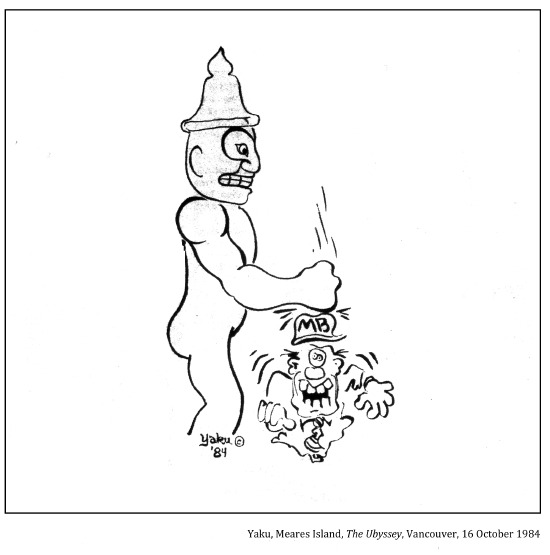
Activists raised a totem pole at UBC's museum of anthropology to bring attention to provincial government plans permitting Macmillan Bloedel to log on Meares Island.




Truly and Humbly: Memories of the first apology
The history of the United Church apology (the first church to apologize for residential schools in 1986)
http://www.manitoulearningcommunity.com/truly-and-humbly-memories-of-the-first-apology/
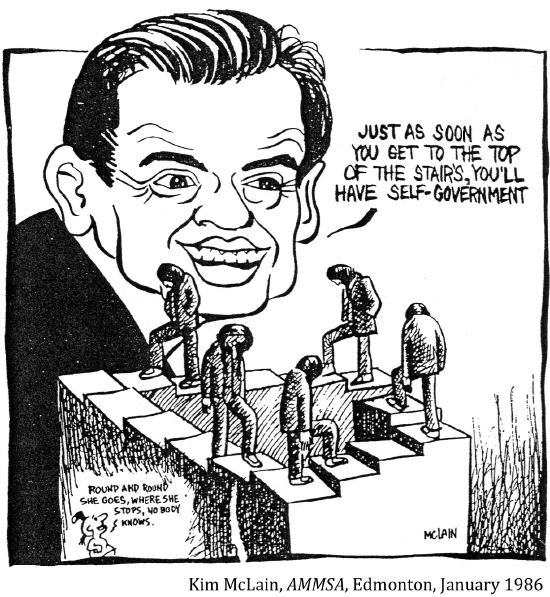

Don Monet, The Law vs. Ayook, 1987

1987, Provincial Archives of Alberta, PR1998.0870.0145, [Premier Don Getty, left; Prime Minister Mulroney, centre]


29 Sept 1988




Popoff, The Gateway, Edmonton, 17 November 1987, reprinted from The Peak, Burnaby


The Gateway, Edmonton, 11 February 1988
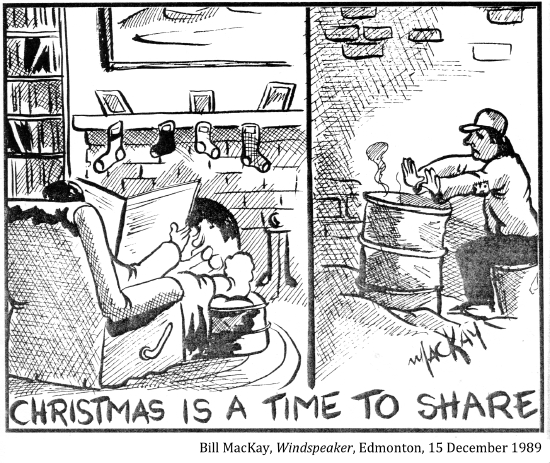

"I don't feel proud that there are ranches in Canada that are bigger than ten or fifteen reserves put together. Do you?" [response to an invitation to help celebrate 175 years of Confederation and the 500th anniversary of the arrival of Columbus]
Georges Erasmus, The Canadian Forum, Jan. 1990

[The Nova Scotia Royal Commission Report on Donald Marshall found a disturbing picture of severe oppression and racial intolerance in the province justice system.]



"One does not correct an injustice by creating another injustice." Robert Bourassa
Réal Bérnard (Cayouche), La Liberte, St. Boniface, 6 July 1990


1990 06 30, Provincial Archives of Alberta, PR2004.0675.0517.30 July 1990

1990 08 26, Provincial Archives of Alberta, PR2004.0675.0517.26 August 1990.0002

Micmac News, Sydney, September 1990




Queen's Journal, Kingston, 30 November 1990
"Our sovereignty was denied and 'reserve' lands were created for us to live within [treaties were not signed in most of British Columbia]. This practice destroyed our economic base, making us and dependent when we had been self-sufficient. And it held us back from fulfilling our obligation to the Creator to protect Mother Earth."
Lil'wat People's Movement – background information, 1991

Don Monet, Colonialism on Trial, 1991



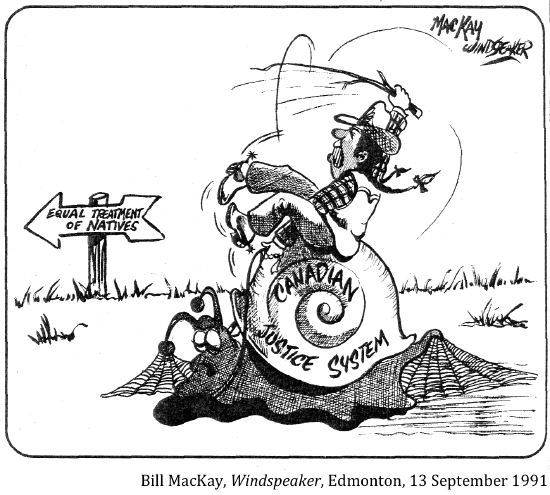
"We want to be recognized as a distinct society too. If the government is willing to recognize the distinct society in Quebec and give it powers to preserve and protect their culture . . . why can't the same treatment be given to us."
Elijah Harper, Winnipeg Free Press, 25 September 1991


1992 06 29, Provincial Archives of Alberta, PR1998.0870.0608
"What was to be done with a people who were, by nature, semi-nomadic, when they began to live collectively in all seasons instead of travelling from camp to camp in search of wild game? The administrators had a ready answer to the Inuit predicament: cultural assimilation, which could later lead to cultural genocide."
Alootook Ipellie, 1993
"We should . . . [be] proud to celebrate Alexander Mackenzie as a man who embodied the very essence of perseverance. . . Mackenzie overcame all odds in exploring the untamed wilderness that would one day become part of a unique country. But he is a footnote in our history, an unknown in most parts of Canada. Mackenzie was an historical failure. Why? Because he didn't murder, maim, rape, pillage or torture. . . He negotiated rather than confronted. He traded rather than stole. He respected the ways of the cultures he encountered rather than trying to change them. Ho hum."
Jerry MacDonald, The Vancouver Sun, 11 August 1993


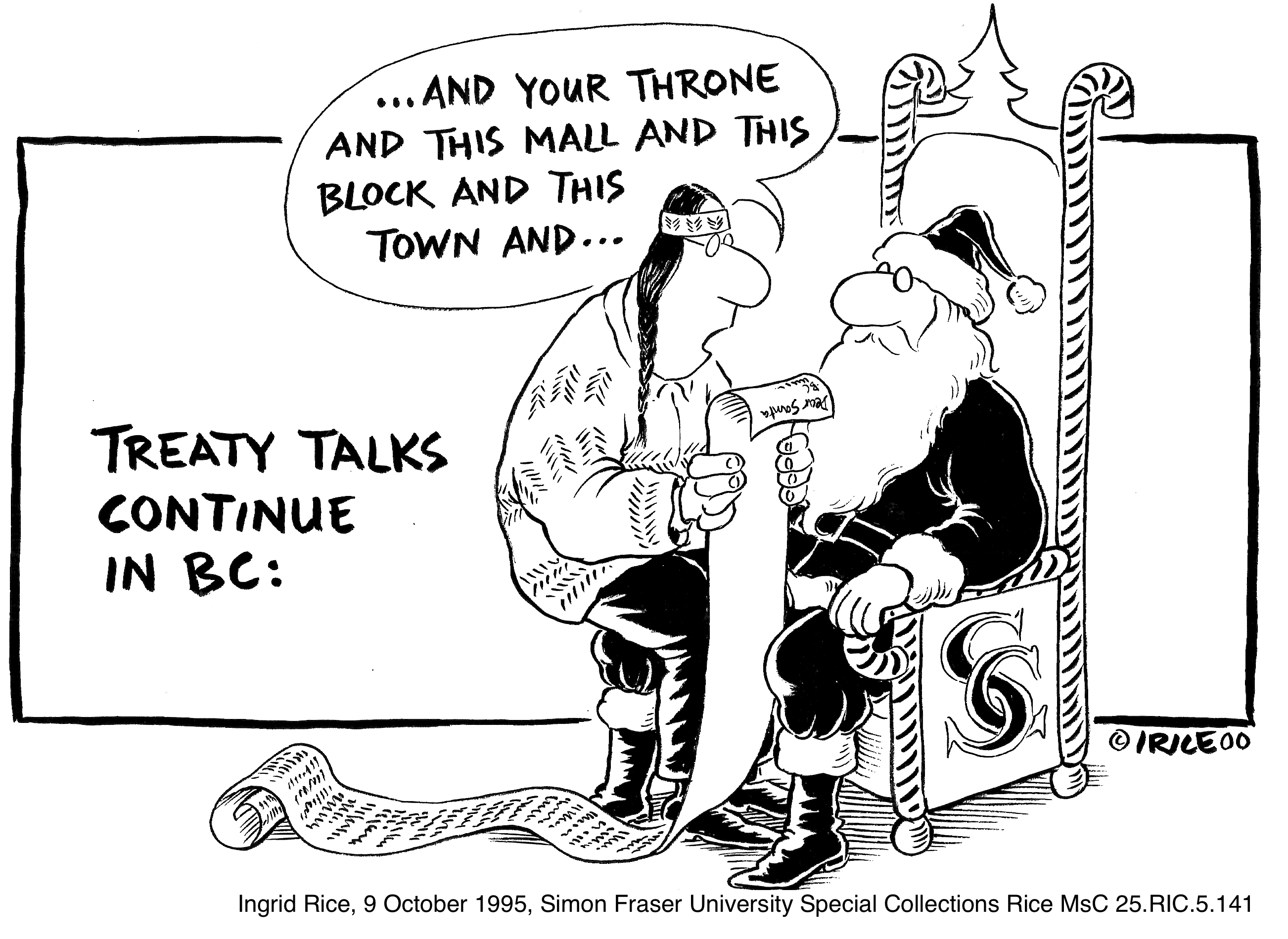


Varsity, Toronto, 25 March 1996


Champlain Statue, Ottawa, Hamilton MacCarthy, 1915 [The monument was erected at the same spot where Champlain made his solar observation in 1613. It was accompanied by a plaque that said the statue was meant to commemorate "the advent into Ontario of the white race."]

"Canada was taking shape: French roots, Loyalist perseverance and Native enclaves. Three people united in their separate tales of defeat."
Will Ferguson, 1997
"The dominant theme found in Canadian history textbooks was the expansion of European civilization in America. Give that way of framing the story, there was no real place for Native people except in so far as they obstructed the process. History was something that happened to other people. . . Once the Iroquois was end the Indians go missing from the textbooks, reappearing briefly [in 1812, 1869, and 1885] . . . Otherwise they have no role to play."
Daniel Francis, National Dreams, 1997
"The Delgamuukw decision of 1997 provided judicial affirmation of Aboriginal Title by the country's highest court."

M. Lei, Varsity, Toronto, 21 January 1997

"An indigenous culture with sufficient territory, and bilingual and intercultural education, is in a better position to maintain and cultivate its mythology and shamanism. Conversely, the confiscation of their lands and imposition of foreign education, which turns their young people into amnesiacs, threatens the survival not only of the people but of an entire way of knowing. It is as if one were burning down the oldest universities in the world and their libraries, one after another — thereby sacrificing the knowledge of the world’s future generations."
Jeremy Narby, “The Cosmic Serpent:DNA and the Origins of Knowledge.” 1998






The creation of Nunavut meant that Inuit people could have a say in government decisions, including preserving their language and way of life.

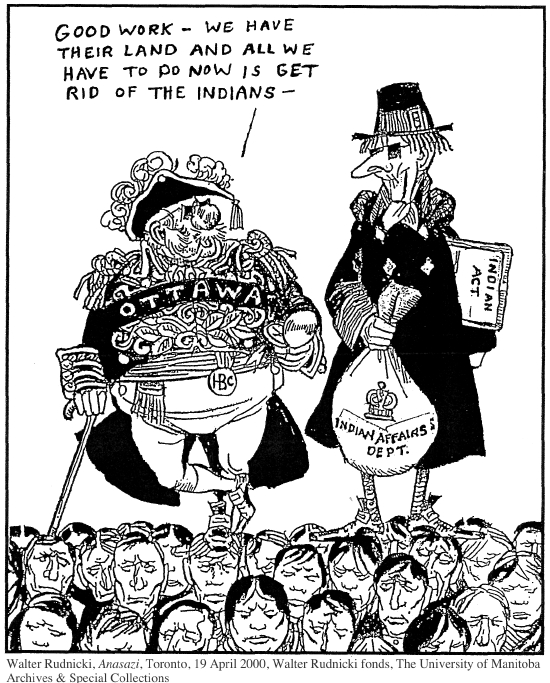
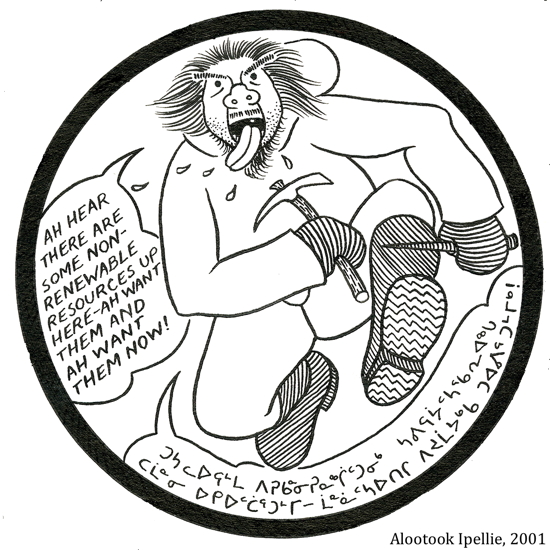

National Aboriginal Veterans Memorial, Noel Lloyd Pinay, Ottawa, 21 June 2001 [National Aboriginal Day]

In 2006: "Phil Fontaine, the national chief of the Assembly of First Nations, warned of the contemporary realities of TB: “In Canada, rates of infection are 10 times higher on Native reserves. In some northern communities, up to half of the population is infected. This is simply unbelievable and unacceptable in any community in Canada in the 21st century.” [The alarm bells are still being ignored.]
Jane Whalen, A Century of Neglect: Epidemic Tuberculosis in Native Communities
http://activehistory.ca/2010/03/a-century-of-neglect-%E2%80%93-epidemic-tuberculosis-in-native-communities/

"The Canadian government pursued this policy of cultural genocide [assimilation] because it wished to divest itself of its legal and financial obligations to Aboriginal people and gain control over their land and resources."
Truth and Reconciliation Report, 2007.
Jordan's Principle
Jordan’s Principle is a child-first principle [passed by the Government of Canada in December 2007] that ensures First Nations children can access the same public services as other children in Canada. Jordan’s Principle is named for Jordan River Anderson, a young Cree boy who died at the age of five after waiting for home-based care that was approved when he was two but never arrived because of a financial dispute between the federal and provincial governments. Jordan’s Principle was put in place to ensure a tragedy like this never happens again.
Jordan’s Principle is an initiative to ensure that First Nations children who require support to meet a health, education or social need — as recommended by a professional — can access those services in the same ways as other children in Canada.
Jennifer Brant, Michelle Filice

[Stephen Point was the first Indigenous person appointed lieutenant-governor of British Columbia.]

Stained Glass Window in Parliament Commemorating the Legacy of Indian Residential Schools, Government of Canada, 2008, https://www.aadnc-aandc.gc.ca/DAM/DAM-INTER-HQ-AI/STAGING/texte-text/sgw_sgwdc_web_1354719933066_eng.pdf
Canadian Federal Government Apology to First Nations - YouTube
https://www.youtube.com/watch?v=xCpn1erz1y8
"We have no history of colonialism."
Stephen Harper

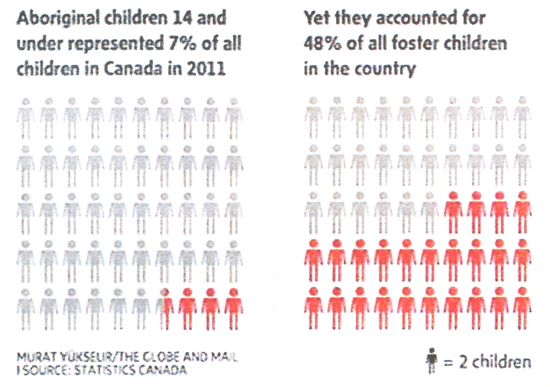



The Hon. Frank Iacobucci releases report on First Nations people and the Ontario justice system
"Ontario’s justice system is in a "crisis" concerning First Nations people who are over-represented in the prison system yet cut out of participating in juries, says an independent review released Tuesday. Former Supreme Court justice Frank Iacobucci revealed 17 recommendations he said must be urgently implemented in order to get First Nations involved in the court process and sitting on juries. . .
It is clear that the jury system in Ontario, like the province’s justice system more generally, and its counterparts . . . has often ignored or discriminated against aboriginal persons," stated Iacobucci in his report on First Nations Representation on Ontario Juries.
If we continue the status quo, we will aggravate what is already a serious situation and any hope of true reconciliation between First Nations and Ontarians generally will vanish."
26 February 2013
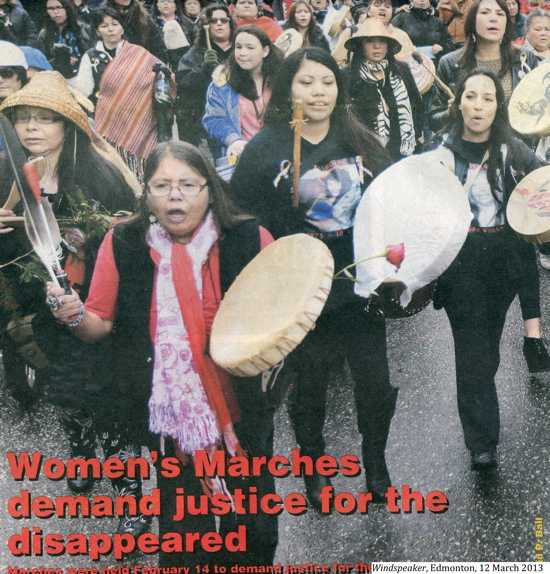
"Why, for almost forty years now, have Aboriginal peoples won virtually every time they go to the Supreme Court? Because or history and the law, if fairly interpreted, cannot but re-establish our long-standing – long betrayed – agreements."
John Ralston Saul, The Comeback, 2014

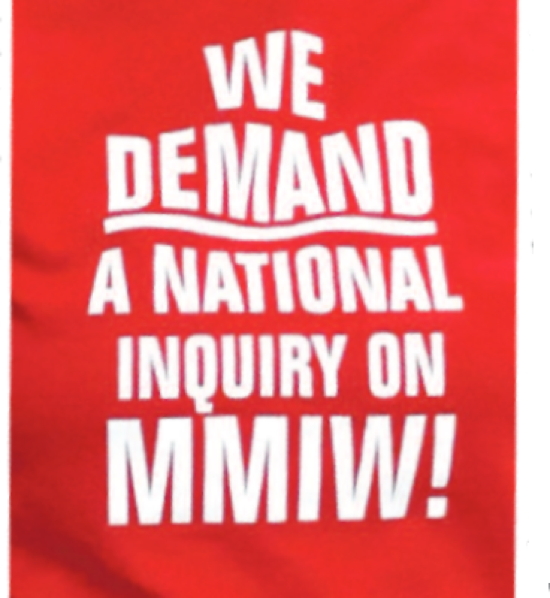
Eagle Feather News, Saskatoon, March 2015

Eagle Feather News, Saskatoon, June 2015

“The land was stolen from underneath us. . . . And it is the loss of the land that has been the precise cause of our impoverishment . . . . Indigenous peoples control only 0.2 per cent of the land and the settlers 99.8 per cent. With this distribution of the land, you don’t have to have a doctorate in economics to understand who will be poor and who will be rich. . . . When we speak about reclaiming a measure of control over our lands, we obviously don’t mean throwing Canadians off it and sending them back to the countries they came from. . . . There is room on this land for all of us and there must also be, after centuries of struggle, room for justice for Indigenous peoples. That is all that we ask. And we will settle for nothing less.”
Arthur Manuel, Unsettling Canada: A National Wake-Up Call
"In Canada, the only good Indian was an assimilated Indian, and as very few of them accepted assimilation, we had very few good Indians."
Will Ferguson, Why I Hate Canadians, p.123
"I do not wish to celebrate Canada stealing our land. That is what Canadians will be celebrating on July 1, the theft of 99.8 per cent of our land, leaving us on reserves that make up only 0.2 per cent of the territories given us by the Creator."
Arthur Manuel, 2017
"On Canada's widely celebrated 150th birthday in 2017, how could it possibly be that record numbers of Native kids were in foster care? Excuse me if we don't feel like partying with the rest of the country."
Chief Clarence Louie, Rez Rules
“No relationship is more important to Canada than the relationship with Indigenous Peoples. Our Government is working together with Indigenous Peoples to build a nation-to-nation, Inuit-Crown, government-to-government relationship – one based on respect, partnership, and recognition of rights."
Justin Trudeau, statement on Aboriginal Day, June 21, 2017
Kent Monkman: History Painting for a Colonized Canada - The Scream
https://canadianart.ca/features/kent-monkman-critiques-canada-150/
Our Canada 150 series continues with Subjugation of Truth by Kent Monkman. This painting shows Chief Pîhtokahanapiwiyin (Chief Poundmaker) and Chief Mistahi-maskwa (Chief Big Bear) sitting dejectedly before a table at which white men are signing away the chiefs’ freedom.
"Indian Act government . . . is not self-government . . . it is an impoverished notion of government where the Chief and council are, for the most part, glorified Indian Agents delivering federal programs and services on behalf of Canada . . . "Reconciliation" means confronting and ending the legacy of colonialism in Canada and replacing it with a future built on Indigenous self-determination."
Jody Wilson-Raybould, From Where I Stand, 2019


Poundmaker Cree Nation, Saskatchewan - May 23, 2019
Prime Minister Trudeau's speech exonerating Chief Poundmaker
https://pm.gc.ca/en/news/speeches/2019/05/23/statement-exoneration-chief-poundmaker

An Indigenous Perspective:
In Cree artist Kent Monkman’s The Subjugation of Truth Chief Poundmaker and Chief Big Bear are placed in the foreground losing their lands as settler leaders including John A. Macdonald take away their future. The primary figures are Indigenous leaders whose land is being stolen, not the former prime minister who engineered its theft. [2016]
https://www.kentmonkman.com/painting/2017/1/9/the-subjugation-of-truth-1

"Now, is it [our history] perfect? Of course not, but we must never allow political correctness to erase what made us who we are. We can and should celebrate the giants of our history. We can look to the past, acknowledge and learn from our mistakes and celebrate achievements at the same time. If we look back on our history and our leaders and see only blemishes, we miss out on a beautiful story of a country that has progressed into one of the safest, freest and most prosperous in the world.
Because despite those who wish to sweep some of these leaders under the rug, they have left their mark not only on our country but on the entire world and they are worthy of honour and respect."
Andrew Scheer, defending men like Sir John A. Macdonald, 18 October 2019"

D. H. Monet, Hereditary Chief, 2020
"In 2016 Indigenous and Black people accounted for 4.8 per cent and 3.5 per cent of the Canadian population but made up 25.5 per cent and 8.7 per cent of those in federal prison [Statistics Canada]. . . There's absolutely no doubt in my mind that there is systematic racism in federal corrections, says Dr. Ivan Zinger, Canada's correctional investigator."
Globe and Mail, Toronto, 24 October 2020
"Real reconciliation must start with addressing the outstanding century-old injustice of Indian reserve land thefts."
Chief Clarence Louie, Rez Rules
"Black men are nearly 24 per cent more likely than white men to receive a 'maximum' initial security rating, the worst possible score, which affects access to treatment programs. Indigenous men, meanwhile, are roughly 30 per cent more likely than their white counterparts to be assigned the worst possible reintegration potential score, which plays a significant role in parole decisions. . . [even though] Indigenous men are 9 per cent less likely to reoffend than white men, and Black people a full 41.1 per cent less likely to do so."
Globe and Mail, Toronto, 25 October 2020
"On April 12, 1876, the Indian Act was introduced to deliberately eradicate First Nations' cultures in favour of assimilation with colonizers. . .
[Residential schools] told me the same messages over and over again
You're no good.
You have no value.
You're just a pagan.
You cannot think for yourself.
God save the King.
God save the Queen.
Say your prayers.
Do the things we tell you to do.
Because that will make you better. . .
. . . the heart of the matter: racism, colonialism, fear and violence.
But We are more than driftwood. . .
There was no redeeming grace about taking little children away from their families, homes and communities; destroying their sense of pride and their language; and stripping them of the ability to have loving relationships with their parents and family. . . If you don't know who you are, how can you know where you came from and where you are going."
Chief Robert Joseph, Namwayut
"Nothing about us without us."
Deirdre Cullon, Indigenous Rights in Decision Making
"So much of the history of this nation has been erased, underplayed or forgotten because it did not fit the dominant society."
David McIIwraith
|









































































































































































































































































































































































































































